4.Day v[1][1]. Sidley &__ Austin
Lesson3334(讲义)新概念英语一册

Lesson 33 A fine day 晴天[词汇](15)★day [deɪ]● Sunday [ˈsʌndeɪ] 星期天Monday [ˈmʌndeɪ] 星期一Tuesday [ˈtju:zdeɪ] 星期二Wednesday [ˈwenzdeɪ]星期三Thursday [ˈθɜ:zdeɪ]星期四Friday [ˈfraɪdeɪ] 星期五Saturday [ˈsætədeɪ] 星期六★cloud [klaʊd]eg. cl★sky [skaɪ]eg. sky blue 天蓝色★sun [sʌn]★shine [ʃaɪn]eg. sunshine 阳光灿烂的★with [wɪð]prep. 和……在一起★family [ˈfæməli] n. 家庭(成员)eg. family name 姓氏family man 有家室的人family doctor 家庭医生●family:家庭(后面的谓语动词用单数)家庭成员(后面的谓语动词用复数)eg. His family has (have/has) four people.Our family are (is/are) teachers.★walk [wɔ:k] v. 走路, 步行eg. walkman n. 随身听录音机★over [ˈəʊvə(r)] prep.跨越,在……之上★bridge [brɪdʒ] n. 桥★boat [bəʊt] n. 船●boat指河中行驶的小船,ship一般指海洋中行驶的大船。
★river [ˈrɪvə(r)] n. 河★ship [ʃip] n. 轮船●cruise ship [kru:z ʃip] 游轮★aeroplane ['ɛərəplein] n. 飞机●aero ['ɛərəu] a. 飞机的,航空的,飞行的●飞机正式用语:aeroplane(英语)、airplane(美语);非正式用语:plane★fly [flaɪ] v. 飞[课文]It is a fine day today. 今天天气很好。
英语中星期一到星期天是什么意思

英语中星期一到星期天是什么意思?Sunday在古英文中的意思是sun's day(属于太阳的日子)。
对基督徒而言, 星期日是「安息日」, 因为耶稣复活的日子是在星期日。
约在公元三百年左右, 欧洲教会和政府当局开始明订星期日为休息的日子, 直到今日, 世界上大多数的国家都以Sunday为星期例假日。
Monday 星期一:根据西方传说, Monday的意思是moon day(属于月亮的日子), 因为西方人把这一天献给月之女神。
古时候西方人相信, 月的盈亏会影响农作物的生长, 也会影响医疗。
此外, 尚有所谓的Blue Monday。
Blue是「忧郁」的意思。
星期一是一周工作的开始, 没得玩了, 所以心情不好, 不少国家将星期一当作family washday(家庭洗濯日), 那是由来已久的习俗。
Tuesday 星期二:Tuesday 是由古英文字Tiw演变来的。
Tiw是北欧神话里的战神, 正如同罗马神话里的战神Mars一样。
在北欧神话中不叫Tiw而叫Tyr。
相传在他的那个时代, 有一狼精经常出来扰乱世界, 为了制服狼精, Tyr的一只手也被咬断了。
Wednesday 星期三:Wednesday在古英文中的意思是Woden's day。
Woden是北欧诸神之父。
为制服狼精而牺牲自己一只手的Tyr, 就是他的儿子。
Woden领导神族跟巨人族作战, 他曾牺牲自己锐利的右眼, 跟巨人族换取「智能」的甘泉。
他也曾深入地层, 从巨人族那里偷取「诗」的美酒。
西方人为了追念这位主神, 就根据他的名字创造了Wednesday这个字。
Thursday 星期四:Thursday在古英文中意思是Thor's day。
Thor是北欧神话中的雷神, 经常带着一把大铁锤。
相传有一次, 他的大铁锤被一位叫Thrym的巨人偷走了。
Thrym 扬言, 除非神族答应把美丽的爱神Freya嫁给他做为交换。
然而Freya抵死不从, 于是神族想了一个办法, 由Thor男扮女装穿Freya的衣服, 假装嫁给他, Thrym 不疑有诈, 把铁锤交给新娘。
四年级下册英语素材-知识点--常识 译林版(三起)

小学英语知识--常识(4B) Unit 1 Our school subjects1.了解更多有关学科的英语名称:语文Chinese数学Maths英语English阅读Reading政治Politics历史History地理Geography 音乐Music生物Biology作文Composition 美术Art班会Squad语文辅导Language and Literature 体育Physical Education(P.E)计算机科学Computer Science健康教育Health Education双语科学Bilingual Science社会科学Social Science综合实践Integrated Science思想品德教育Moral Education2.Monday 星期一:在古罗马神话中, Monday的意思是moon day(属于月亮的日子),因为西方人把这一天献给月之女神.古时候西方人相信, 月的盈亏会影响农作物的生长, 也会影响医疗.此外, 尚有所谓的Blue Monday. Blue是「忧郁」的意思.星期一是一周工作的开始, 没得玩了, 所以心情不好, 不少国家将星期一当作family washday(家庭洗濯日), 那是由来已久的习俗.3.Hello, David! Hey, James!How are you doing? (熟人见面用,第一次见面不能用)How are you?Howdy?美国的店员在你结帐的时候都会问这一句, 所以要有心准备, 只要答一声, good 就好, 不用再反问. Good! (Pretty good)I am great.I am Fine.I am all right.I am doing good.I am wonderful.Not bad.Well, a little bit tired.礼貌上, 你答完之後, 要再反问: How are you doing?What's up?有没有什麽事啊? Not much! Nothing much!4.美国小学教室的布置:走进一间科学教室,感觉像走进一个小博物馆:天花板上悬吊着各类飞行物模型,四周橱柜中摆放着动植物标本,令人叹为观止.原来,在高中,一般是分专业上课,即我们现在所说的“走班”制:老师固定教室,流动的是学生.在专业教室,四周墙壁和天花板上张贴的都是与科目有关的资料和图片.如历史、地理学科专用教室,贴的就是地图、历史事件、研究专题等;语言教室,张贴着写作知识、经典语录、名人演讲等.此外,教室内多配置了壁橱,供学生存放学习、生活用品.教室内有图书角、动物角、玩具角、卫生角、植物角、电脑角等.图书角摆满了各种工具书以及各类科学常识书籍,供学生们随时查阅.教室桌椅摆放的形式,也各不相同.有的朝一个方向摆成半圆状;有的摆成几个小圈;有的分成若干个大组,相对而坐;有的甚至一组朝前,一组朝右,一组朝左,五花八门.每间教室的桌椅,都是教师根据自己的教学需要来摆放的.在参观中,我们观摩了一节实验课,教师讲解实验要求时,教室的音箱里播放着轻松的音乐,学生们在教室可以随意走动讨论,仿佛在家中自习一般.Unit 2 After school1.星期的由来:周一到周日的名字英文的大多来源于神话中的神的名字和圣经.Monday来源于Mona,日耳曼的月神Tuesday来源于日尔曼神Tyr,大神奥丁的儿子Wednesday,来源于日尔曼主神Woden,即大神奥丁(Odin)Thursday,来源于日尔曼的风雨雷电之神ThorFriday,来源于日尔曼的爱与美的女神,大神奥丁的妻子FriggSaturday,可能来源于土星,安息日Sunday,来源于“太阳日”;主的日子古巴比伦人创立的星期制,首先传到古希腊、古罗马等地.古罗马人用他们自己信仰的神的名字来命名1周7天:Sun’s-day(太阳神日)Moon’s-day(月亮神日)Mars’s-day (火星神日)Mercury’s-day(水星神日)Jupiter’s-day(木星神日)Venus’-day(金星神日)Saturn’s-day(土星神日)这7个名称传到不列颠后,盎格鲁-撒克逊人又用他们自己信仰的神的名字改造了其中4个名称,以Tuesday、Wednesday、Thursday、Friday分别取代Mar's-day、Mercury's-day、Jupiter's-day、Venus'-day. Tuesday来源于Tiu,是盎格鲁-撒克逊人的战神;Wednesday 来源于Woden,是最高的神,也称主神;Thursday来源于Thor,是雷神;Friday来源于Frigg,是爱情女神.这样就形成今天英语中的1周7天的名称:Sunday(太阳神日,即星期日),Monday(月亮神日,即星期一),Tuesday(战神日,即星期一),Wednesday(主神日,即星期三),Thursday(雷神日,即星期四),Friday(爱神日,即星期五),Saturday(土神日,即星期六).Unit 3 My day1.足球的起源:足球运动是一项古老的体育活动,源远流长.现代足球运动起源于英国,从英国走向欧洲,从欧洲走向世界--现代足球已经成为了世界上最受欢迎的体育项目,成为了世界第一运动!足球起源于我国古代一种球类游戏“蹴鞠”,“蹴鞠”是有史料记载的最早足球活动.《战国策》和《史记》是最早记录蹴鞠的文献典籍,前者描述了2300多年前的春秋时期,齐国都城临淄(现山东淄博)流行蹴鞠活动,后者则记载,蹴鞠是当时训练士兵、考察兵将体格的方式(“蹹鞠,兵势也,所以练武士,知有材也”)后来经过阿拉伯人传到欧洲,发展成现代足球.所以说,足球的故乡是中国.2004年5月8日,国际足联主席布拉特明确表示:足球起源于中国古代的蹴鞠.2004年7月15日,亚足联秘书长维拉潘先生代表国际足联和亚足联,在北京举行的第三届中国国际足球博览会开幕式后召开的足球起源新闻发布会上正式宣布中国是足球的起源地.2.英国人的三餐:生活中一日三餐必不可少,那么英国人的三餐吃些什么呢?早餐英式早餐在世界上享有盛名,传统的英式早餐有煎培根、香肠和煎土司.但现在的英国人为了适应快节奏的胜过更加青睐方便食品,如土司涂果酱.午餐英国人的午餐只需要三十到四十分钟,大多数的英国人都选择吃三明治.此外,点心在英国很普遍.吃点心的时间是从上午十一点到下午三点.晚餐晚餐是英国人的主餐.通常会有两道菜,像肉或鱼加蔬菜,之后还会有甜点.在吃甜点之前,家长们会要求孩子尽量把肉和蔬菜吃掉.3.大本钟:大本钟位于伦敦西敏寺北端议会大厦98米高的钟塔内,建于1859年.安装在西敏寺桥北议会大厦东侧高95米的钟楼上,钟楼四面的圆形钟盘,直径为6.7米,是伦敦的传统地标.每当议会召开会议的时候,大钟上方的灯就会点亮.一到夜晚,大钟在灯光的照耀下,静静地浮在夜空中,从对岸观望更觉壮观.大本钟有四个钟面,每个钟面各由312块乳白色玻璃镶嵌而成.透过玻璃,时针和分针清晰可见.负责钟塔工程的人叫做本杰明·霍尔,人们便以他名字的爱称尊称这座时钟塔楼为“大本钟”.最初这个名字只是赋予塔中那座13吨重的大钟,如今却已成为整个塔楼的名字了.建造之初,英国皇家天文馆就要求大钟每个钟点的第一响准确到误差不超出一秒钟,对于这个带着笨重的机械敲击装置、指针暴露在风吹雨打之中的巨钟来说,这个要求似乎是太苛刻了.不过,最终大本钟还是按照要求建造完毕,并且表现良好.仿照剑桥的大圣玛丽教堂,每个准点敲响的钟声,配合了如下的词句:“愿这个钟头的分分秒秒,上帝导我前行,以主之能,佑吾民平安.”作为伦敦市的标志以及英国的象征,大本钟巨大而华丽,重13.5吨,四个钟面的面积有两平方米左右.大本钟从1859年就为伦敦城报时,根据格林尼治时间每隔一小时敲响一次,至今将近一个半世纪,尽管这期间大本钟曾两度裂开而重铸.现在大本钟的钟声仍然清晰、动听.自从1859年投入使用后,英国政府每隔五年就要对大本钟实施维护,包括清洗钟体、替换大本钟的报时轮系和运转轮系等.在2009年5月31日,大本钟度过了它150岁的生日,而在1859年7月11日,大本钟则首次整点报时.据负责大本钟的英国钟表师说,大本钟每三天就失去动力了,所以他们每周必须爬上去三次,为它上弦.同时他们可以通过调整钟摆上方放置的小钱币,调整大本钟走时的快慢.比如增加1便士硬币,就相当于一天把表调快了0.4秒.看来,时间就是金钱,在大本钟上倒是体现的不错.2012年6月,为纪念大不列颠及北爱尔兰联合王国伊丽莎白二世登基60周年,大本钟正式更名为伊丽莎白塔.Unit 4 Drawing in the park1.关于riverThe Yangtze River 长江The Yellow River 黄河The Amazon River 亚马逊河(世界第一大河,流域面积最大的河)The Nile River 尼罗河(世界第一长河)The River Thames 泰晤士河(英国一河流,位于伦敦)The Danube 多瑙河(欧洲第二大河)2.关于英国小学生的学校生活:英国的小学都不大,一个学校一般只有两三百个孩子,一个年级通常只有一个班,班上二三十个孩子.因为学校规模小,所以数量就很多,一个住处,方圆一英里内往往有许多所小学可供选择.学校要求学生早上8点55分到校,下午3点半放学.每天早上,早到的孩子们可以在操场上玩,但不能进教室(教室的门是锁着的).8点55分音乐铃响起,小朋友们排队由老师领进教室.进教室后,老师先与每一位小朋友依次互问早安,然后开始正式上课.学校非常重视孩子们的劳逸结合.校长的要求是:晚上8点前必须要睡觉,每天必须睡够11个小时,在学校期间,不允许有一个孩子打呵欠!英国小学生上课内容五花八门,多为游戏、手工、绘画、科学、讲故事、数学运算等.孩子们没有固定的座位,游戏教室更是脱了鞋子盘腿坐一圈或者干脆光脚奔跑.学校还经常安排学生去博物馆或其他公共场所参观,甚至去电影院看电影,也经常带孩子们去室外感受大自然.像科学课,老师会让孩子们自己动手挖池塘,在池塘里养鱼、蜗牛以及各种水生生物,充满好奇心的孩子们一个个乐此不疲.为了让学生走出教室尽情地玩,课间休息期间,教室的门会被上锁.学校操场上,除了可以踢足球、打篮球,还有各类游戏设施,如闯关、攀岩,以及与国内玩法几乎一致的“跳房子”游戏.为确保孩子的安全,操场上会有一两位老师照看.他们背着药箱,里面配有冰袋及各类跌打擦伤之类的药品,以便孩子们在不慎受伤时迅速冷敷或包扎,这个人性化的安排让人忍不住真心赞叹!3.讲礼貌的英国人:英国人待人彬彬有礼,讲话十分客气,"谢谢"、"请"字不离口.对英国人讲话也要客气,不论他们是服务员还是司机,都要以礼相待,请他办事时说话要委婉,不要使人感到有命令的口吻,否则,可能会使你遭到冷遇.英国人对于妇女是比较尊重的,在英国,"女士优先"的社会风气很浓.如走路时,要让女士先进.乘电梯让妇女先进.乘公共汽车、电车时,要让女子先上.斟酒要给女宾或女主人先斟.在街头行走,男的应走外侧,以免发生危险时,保护妇女免受伤害.丈夫通常要偕同妻子参加各种社交活动,而且总是习惯先将妻子介绍给贵宾认识.按英国商务礼俗,随时宜穿三件套式西装,打传统保守式的领带,但是勿打条纹领带,因为英国人会联想到那是旧"军团"或老学校的制服领带.英国人的时间观念很强,拜会或洽谈生意,访前必须预先约会,准时很重要,最好提前几分钟到达为好.他们相处之道是严守时间,遵守诺言.4.中外校园生活差异:学生去学校可以不背书包,课本、文具等全由学校提供并保管.校服不强求统一,但要求穿深色衣服.英国学校都是九点钟才上课,所以从未在第一节课的课堂上出现许多恹恹欲睡的双眼.课堂上最大的不同在于学生上课的时候觉得好像在玩游戏.英国的学校很强调班级不能太大,要因人而教,上课很随便,有的课程学生们分组围坐在小方桌旁,听老师讲课.老师讲课的时间不多,课堂以孩子们的分组活动为主,包括讨论,辩论,实践活动等等形式.英语课的授课方式多种多样,老师常带她们到学校外的商店,广场等公共地方,进行实践,把所学的东西活学活用.这点和中国的学校形成很大对比.这所学校一周只要做一次家庭作业.平时老师对学生都是以肯定和鼓励为主,学期末的成绩单评语也多为鼓励性的,从来没有排名的做法,这样可以保护差生的自尊心.在班上你会发现经常有学生缺勤,千万不要大惊小怪,因为这在英国的学校是很普遍的,他们大都是去随家人旅游了.这种情况,在中国简直是想都不敢想.还有一点很大的差异就是英国的学校很重视对学生进行"山野教育",其意义就是让学生经受磨练,训练学生的体能、冒险精神和生存能力,然而在中国的很多学校都是整个学期只有难得的一两次社会实践机会.Unit 5 Seasons1.关于英国天气:在英格兰,人们喜欢讨论天气,因为他们在一天当中能够经历四个季节,早晨可能天气像春天般温暖,一个小时候可能乌云密布,然后下起了大雨.天气有点冷,下午,天气将会变得晴朗,太阳会重新照耀,并且会像一年中的夏天.在英格兰,人们在夏天也能感受到冬天,或者冬天能感受到夏天.所以,在冬天有事也可以游泳,在夏天也可能穿温暖的衣服.当你去英格兰的时候,你会看到人们在晴朗的早晨可能手中拿着雨伞或者雨衣,但是你不应该嘲笑他们,如果你不带雨伞或者雨衣,你可能会后悔的.2.风筝的由来:风筝起源于中国,最早的风筝是由古代哲学家墨翟制造的.据《韩非子·外储说》载:墨翟居鲁山(今山东青州一带)“斫木为鹞,三年而成飞一日而败.是说墨子研究了三年,终于用木头制成了一只木鸟,但只飞了一天就坏了.墨子制造的这只“木鹞”就是中国最早的风筝.中国风筝问世后,很快被用于测量传递信息,飞跃险阻等军事需要.唐宋时期,由于造纸业的出现,风筝改由纸糊,很快传入民间,成为人们娱乐的玩具.宋朝风筝已在民间广泛流行,随着国际交往的增加,中国的风筝流传到世界各地.先是传到日本和朝鲜等近邻国,后又漂洋过海,传到了缅甸、马来西亚、印度尼西亚和新西兰,直到更远的东方岛屿上;另一线则顺着“丝绸之路”或蒙古人的征战路线,进入了阿拉伯和西欧.元代在中国为官十七年的意大利人马克·波罗归国后,也把风筝传到了西方. 3.爱谈天气的英国人:英国人见面喜欢谈论天气,其原因主要有两个:一是英国人性格内向,不喜欢表露自己的感情,不爱讲个人私事,于是只好“谈天”.二是英国天气变化无常,气候之恶劣世界闻名.苏格兰东北部晴日只占全年的五分之一,雾雨冰雪天经常可见.在英格兰连续三星期不下雨的情况极少见,一年之中有半年是断断续续的阴雨天,伦敦更是一天当中就有春夏秋冬四季变化,所以在“谈天气”时,人们极少赞扬,一般总是抱怨.伦敦是有名的“雾都”.每年秋冬季节,伦敦地区大雾弥漫,伸手不见五指,白昼犹如黑夜.近20 年来,由于重视环境保护,冬季出现浓雾的现象已大大减少.但在夏季晴和的好天气中还时有薄薄的雾霜,这主要是岛国的潮气所致.为此,英国战前首相阿瑟·内维尔·张伯伦(Arthur Neville Chamberlain )一年四季雨伞不离手,在国内外曾传为趣闻.Unit 6 Whose dress is this?1.牛仔裤的由来:说起牛仔裤,人们自然会想起1849年美国那次淘金潮,当时第一批踏上美国大陆的移民,他们可以说是一穷二白,他们不得不拼命的工作.强烈的劳动使得衣服极易磨损,特别是在1849年矿工们一窝蜂涌进加利福尼亚州,形成了当时著名的淘金潮.由于衣料非常容易破损,人们迫切希望有一种耐穿的衣服.而这个时候,一些工厂用热那亚的帆布生产工作裤时,就将那种帆布叫做genoese,意思就是“热那亚的”.后来干脆把用那种帆布制成的裤子叫做genoese.后来演变成"jeans". 这样坚实、耐用的牛仔裤应运而生.利维??斯特劳斯(Levi Strauss)被公认为是牛仔裤的发明者.1850年,他所创立的利维公司(Levi`s)生产的501牛仔裤就是世人所知的牛仔裤的鼻祖了.30年代中期,在美国中西部农业地带几乎人人都穿的牛仔裤第一次被带到密西西比河以东的繁华都市,从此牛仔裤开始步入流行服装的行列.第二次世界大战期间,美国当局把牛仔裤指定为美军的制服,大批的牛仔裤随盟军深入欧洲腹地.战后士兵返回美国,大量积存牛仔裤在当地限量发售由于这种裤子美观、实用、耐穿,又价格便宜,所以在当地大受欢迎.于是欧洲本地的工作服制造商纷纷争相仿效美国的原装货色,从而使牛仔裤在欧洲各地普及、流行开来.美国好莱坞的影视娱乐业对带动牛仔裤的国际流行风潮起了不可低估的作用.50年代期间的著名电影如《无端的反抗》、《天伦梦觉》等,片中的主角都穿着舒适、大方的牛仔裤,在那些大牌明星引导潮流的影响下,牛仔裤在当时成为一种时尚的标志.60、70年代,摇滚乐的广泛流行和嬉皮士生活方式对青少年的影响,更使牛仔装大行其道.这时,牛仔装也进入上流社会,名门贵族也竞相穿起了牛仔裤.其中有英国的安娜公主,埃及的法赫皇后,摩洛哥的国王哈桑二世和约旦国王侯赛因以及法国前总统蓬皮杜等都喜穿牛仔装.更富有戏剧性的则是美国前总统卡特还穿着牛仔装参加总统竞选.从此这条出身卑贱的牛仔装一跃而身价百倍,久盛不衰.2.关于化妆舞会:Fancy dress party是大家都穿着漂亮高档衣服出席的那种聚会,也就是化妆舞会.化妆舞会来源于欧洲化妆舞会是欧美上流社会在公司年会或大型庆功会、时尚派对上的一种安排.有参加过这种派对的人士称,这种化妆舞会高雅,乐趣无穷,不仅形式别致,给人新鲜和刺激,还可以给陌生人相识提供一次完美的机会.正如歌上所唱:“我戴着面纱和镶着假钻的头缀,参加这场期待已久的化妆舞会.我知道这将是我惟一的机会,与你熟悉却又陌生地相对.……你终于温柔地走向我,赶走了灰姑娘的自卑.”相传2500年前,居住在爱尔兰的塞尔特人以10月31日为每年的最后一日,11月1日便是新一年的开始,也象征冬天的来临.在这新旧年交接的夜晚,塞尔特人相信死亡之神Samhain会带着看不见的灵魂重返人间,找寻替身后得以重生,因此他们燃点火炬,焚烧动物以作为给死亡之神的献礼,而族中的祭师也会主持祭典.为了驱赶黑夜中的游魂野鬼,塞尔特人会利用动物的头或皮毛打扮成鬼怪的模样,口中并发出可怕的声音,这就是欧美万圣节化妆舞会的由来.Unit 7 What’s the matter?1.麻烦的matter:你怎么啦?你有什么麻烦/烦恼事啦?英语中有三种常见表达:What’s wrong with you?What’s the matter with you?What’s the trouble with you?当然,口语中还可以说:What’s biting you? = What’s eating you?这几个用法一般可以互换,意义和用法也没有多大区分.What’s up?是美国口语,语气类似“最近怎样?现在如何?近来可好?”等,接近How are you?What’s the matter?表示发生什么事情了,一般倾向是一定有事情发生.matter作可数名词讲,意为“事情;问题;情况”.the matter意为“有问题;出毛病;麻烦事”.2.英美人的饮食习惯:由于地域、气候以及生活习惯的不同,每个国家的人都有自己的饮食习惯.那你们知不知道英国人和美国人的饮食习惯和我们的有什么不同呢?英国人很会保养,早上一睁眼就先喝“被窝茶”,用它冲去睡意,然后再享用早餐.他们的早餐通常包括麦片(oatmeal)、牛奶、果汁(juice)、黄油点心(butterPastries)、三明治(sandwiches)以及煮鸡蛋(boiled eggs)等.他们的午餐通常和晚餐一般有两菜一汤,牛肉(beef)、羊肉(mutton)、鸡肉(chicken)、鱼肉(fish)等搭配食用,还会外加点心、水果和咖啡(coffee).对英国人来说,一日三餐他们并不要求数量,但绝对要求质量,他们要求清淡、鲜嫩,而且各种调味品一应俱全,可以自由挑选,以配合自己的口味.此外,英国人十分讲究“午后茶”.工作单位每天下午4点半左右会免费为员工提供茶(black tea)、牛奶和点心.在上层社会,邀请朋友饮茶仅次于设宴.由于历史原因,美国人和英国人的饮食习惯很像.但美国人不喜欢吃蒜(garlic)和酸辣的食品,而且忌食动物内脏.在饮料方面,美国人经常喝可口可乐(Coca Cola)、啤酒(beer)、果汁等.此外,美国人经常吃快餐食品(fast food),可能由于美国人十分讲求时间和效率,快餐业便应运而生.在美国,最受欢迎的快餐食品包括热狗(hot dog)、汉堡包和炸面包圈(doughnut)等.Unit 8 How are you?1.英国人喜欢在社区看病:英国人人都有注册登记自己的全科医生,未成年的孩子由其父母代为注册,这是一项法定的权利.在英国,全科医生就是社区卫生服务工作者,他们起着“守门员”的作用,因为英国病人80%的就诊活动都发生在这些全科医生的诊所中,全科医生能处理95%的医疗问题,遇到剩下5%的医疗问题包括中风、动大型手术等的时候,才会到医院就诊.英国之所以能把医疗问题在社区就解决掉,一个很关键的原因是英国人非常信任自己的全科医生,他们非常不喜欢医院,更不喜欢去医院看病.这与中国人完全相反.在英国,全科医生最了解自己病人的情况,所以即使是送到医院的病人,医院与病人的全科医生之间还存在合作关系,因为医院给病人进行治疗等都离不开全科医生的协助.在英国,所有诊所的墙上都不会贴有任何广告,有的只是关于健康教育的宣教资料.另外,由于全科医生的收入与在他(她)名下注册登记的病人数量有关,所以全科医生是被允许做广告宣传自己以招揽“生意”的,但几乎没有医生会那么做.卡特说,这是因为英国人自己都会分辨所在社区里哪个全科医生好,哪个全科医生适合自己.同时,作为病人,即使选择在某全科医生那里注册登记了,也可以随时更换自己的医生,相关的资料也可携带到另一个医生那里去.2.关于礼仪:邀请礼仪:就回复邀请函而言,西方的礼仪比中国要讲究很多.当你接到一份邀请函,你一定要马上回复,告知是否愿意接受邀请.如果在谈话或会议上接到口头邀请,你应该当时答复是否接受,若是当时不能答复,那么你一定要说:“今天晚上答复你可以吗?”等等.赴会礼仪:当你被邀请参加晚宴或其他活动,迟到很不礼貌,最好准时到达.门口迎接:当你到达后,主人或家里的其他成员会在门口处迎接,帮你挂好外套和帽子.因此,不要穿太多衣服,特别是冬天,家里会很温暖.进餐:主人会邀请客人们进餐.男士不一定要带女伴,但女士随同的话,这位女士要挽着同伴的胳膊进入.如果是独自来访,则女士先进,男士尾随其后.主人要么给每位客人指定座位,要么发给每位客人一张写有座位号的卡片.停留多久合适:宴会结束后,马上离开是不礼貌的行为.至少要待够半小时,否则会让人感觉只是为了一顿饭而来.若是晚宴,则意味着要持续整个晚上,主人通常会安排些餐。
太空一日缩写400字

太空一日缩写400字太空一日缩写,也称为SOL(Solar day)或Martian day(Mars day),是太阳系中一些天体的自转周期,即它们绕自身轴旋转一周的时间。
下面从太阳系中的三个天体的角度介绍它们的太空一日缩写。
一、地球的太空一日缩写地球的自转周期为23小时56分4.1秒,但地球同时也在围绕太阳公转,所以地球上每个日出到日落的时间(即地球上的“日”)为24小时。
因此,地球的太空一日缩写为1 SOL(Solar day),也就是24小时。
这是航天员和国际空间站上的人们使用的标准时间单位。
二、火星的太空一日缩写火星是太阳系中唯一一个类似于地球的行星,因为它的自转周期(即一天的时间)非常接近于地球的自转周期。
火星的自转周期为24小时39分35秒,因此它的太空一日缩写为1 SOL,也就是24小时39分35秒。
火星探测车和火星车队的任务使用这个时间单位。
三、木星的太空一日缩写木星是太阳系中最大的行星,也是自转最快的行星之一。
木星的自转周期只有9小时50分30秒,因此它的太空一日缩写为1 Jovian day,也就是9小时50分30秒。
由于木星的自转速度非常快,所以它的大气层中存在着巨大的旋涡和风暴。
这个时间单位一般使用于进行木星探测的任务。
总结:太空一日缩写是太阳系中一些天体的自转周期,它们分别是地球、火星和木星。
地球的太空一日缩写为1 SOL,也就是24小时;火星的太空一日缩写为1 SOL,也就是24小时39分35秒;木星的太空一日缩写为1 Jovian day,也就是9小时50分30秒。
在太空探测任务中,使用正确的时间单位非常重要,因此太空一日缩写的概念也非常重要。
四级考试4500词汇逻辑辩证记忆(六)
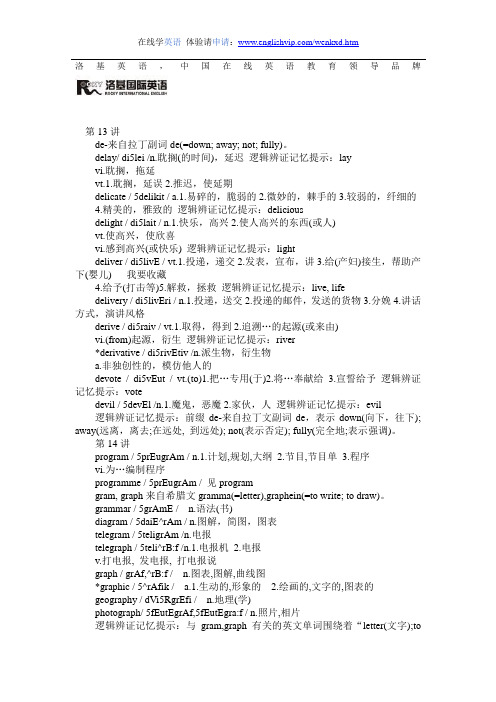
洛基英语,中国在线英语教育领导品牌第13讲de-来自拉丁副词de(=down; away; not; fully)。
delay/ di5lei /n.耽搁(的时间),延迟逻辑辨证记忆提示:layvi.耽搁,拖延vt.1.耽搁,延误2.推迟,使延期delicate / 5delikit / a.1.易碎的,脆弱的2.微妙的,棘手的3.较弱的,纤细的4.精美的,雅致的逻辑辨证记忆提示:deliciousdelight / di5lait / n.1.快乐,高兴2.使人高兴的东西(或人)vt.使高兴,使欣喜vi.感到高兴(或快乐) 逻辑辨证记忆提示:lightdeliver / di5livE / vt.1.投递,递交2.发表,宣布,讲3.给(产妇)接生,帮助产下(婴儿) 我要收藏4.给予(打击等)5.解救,拯救逻辑辨证记忆提示:live, lifedelivery / di5livEri / n.1.投递,送交2.投递的邮件,发送的货物3.分娩4.讲话方式,演讲风格derive / di5raiv / vt.1.取得,得到2.追溯…的起源(或来由)vi.(from)起源,衍生逻辑辨证记忆提示:river*derivative / di5rivEtiv /n.派生物,衍生物a.非独创性的,模仿他人的devote / di5vEut / vt.(to)1.把…专用(于)2.将…奉献给 3.宣誓给予逻辑辨证记忆提示:votedevil / 5devEl /n.1.魔鬼,恶魔2.家伙,人逻辑辨证记忆提示:evil逻辑辨证记忆提示:前缀de-来自拉丁文副词de,表示down(向下,往下); away(远离,离去;在远处, 到远处); not(表示否定); fully(完全地;表示强调)。
第14讲program / 5prEugrAm / n.1.计划,规划,大纲 2.节目,节目单 3.程序vi.为…编制程序programme / 5prEugrAm / 见programgram, graph来自希腊文gramma(=letter),graphein(=to write; to draw)。
“星期一到星期日” 的英语单词及渊源
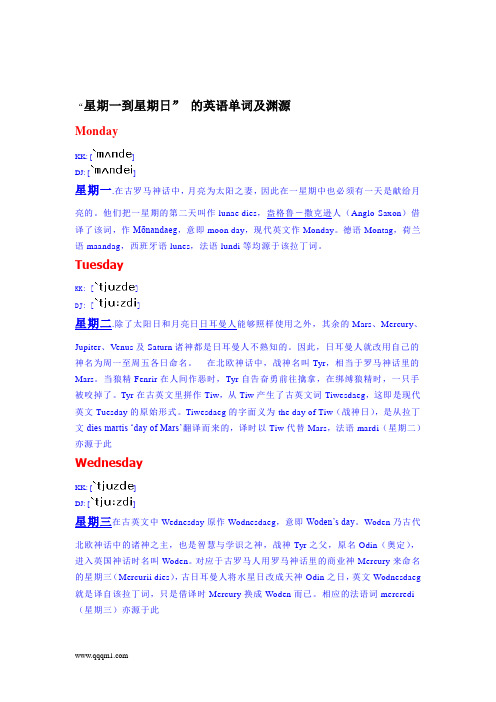
“星期一到星期日”的英语单词及渊源MondayKK: []DJ: []星期一.在古罗马神话中,月亮为太阳之妻,因此在一星期中也必须有一天是献给月亮的。
他们把一星期的第二天叫作lunae dies,盎格鲁-撒克逊人(Anglo-Saxon)借译了该词,作Mōnandaeg,意即moon day,现代英文作Monday。
德语Montag,荷兰语maandag,西班牙语lunes,法语lundi等均源于该拉丁词。
TuesdayKK: []DJ: []星期二.除了太阳日和月亮日日耳曼人能够照样使用之外,其余的Mars、Mercury、Jupiter、Venus及Saturn诸神都是日耳曼人不熟知的。
因此,日耳曼人就改用自己的神名为周一至周五各日命名。
在北欧神话中,战神名叫Tyr,相当于罗马神话里的Mars。
当狼精Fenrir在人间作恶时,Tyr自告奋勇前往擒拿,在绑缚狼精时,一只手被咬掉了。
Tyr在古英文里拼作Tiw,从Tiw产生了古英文词Tiwesdaeg,这即是现代英文Tuesday的原始形式。
Tiwesdaeg的字面义为the day of Tiw(战神日),是从拉丁文dies martis ‘day of Mars’翻译而来的,译时以Tiw代替Mars,法语mardi(星期二)亦源于此WednesdayKK: []DJ: []星期三在古英文中Wednesday原作Wodnesdaeg,意即Woden’s day。
Woden乃古代北欧神话中的诸神之主,也是智慧与学识之神,战神Tyr之父,原名Odin(奥定),进入英国神话时名叫Woden。
对应于古罗马人用罗马神话里的商业神Mercury来命名的星期三(Mercurii dies),古日耳曼人将水星日改成天神Odin之日,英文Wodnesdaeg 就是译自该拉丁词,只是借译时Mercury换成Woden而已。
相应的法语词mercredi (星期三)亦源于此这个词的英文拼写在14、15世纪间变来变去,如Wensday、Wenysday、Wonesday 等等,照例都没有字母d。
七年级上册英语单词音标做卡片507个词人名68个共575个词解答
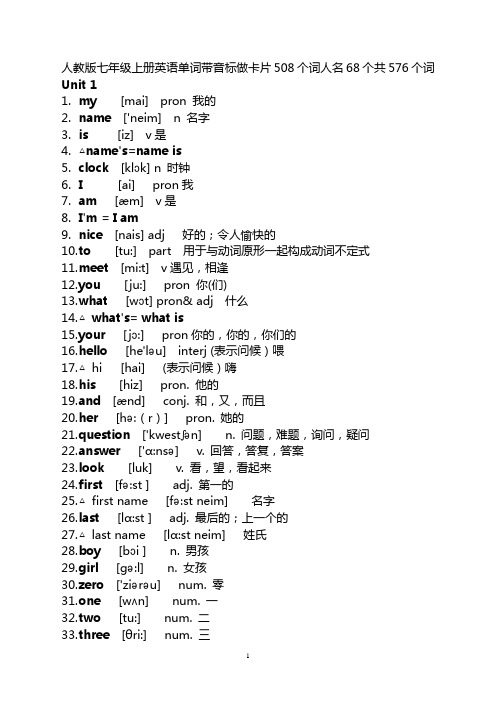
人教版七年级上册英语单词带音标做卡片508个词人名68个共576个词Unit 11.my [mai] pron 我的 ['neim] n 名字3.is[iz] v是4.△name's=name is5.clock [klɔk] n 时钟6.I[ai] pron我7.am [æm] v是8.I'm =I am9.nice [nais] adj 好的;令人愉快的10.t o [tu:] part 用于与动词原形一起构成动词不定式11.m eet [mi:t] v遇见,相逢12.y ou [ju:] pron 你(们)13.w hat [wɔt] pron& adj 什么14.△what's= what is15.y our [jɔ:] pron你的,你的,你们的16.h ello [he'ləu] interj (表示问候)喂17.△hi [hai] (表示问候)嗨18.h is [hiz] pron. 他的19.a nd [ænd] conj. 和,又,而且20.h er [hə:(r)] pron. 她的21.q uestion ['kwestʃən] n. 问题,难题,询问,疑问22.a nswer ['ɑ:nsə] v. 回答,答复,答案23.l ook [luk] v. 看,望,看起来24.f irst [fə:st ] adj. 第一的25.△first name [fə:st neim] 名字26.l ast [lɑ:st ] adj. 最后的;上一个的27.△last name [lɑ:st neim] 姓氏28.b oy [bɔi ] n. 男孩29.g irl [gə:l] n. 女孩30.z ero ['ziərəu] num. 零31.o ne [wʌn] num. 一32.t wo [tu:] num. 二33.t hree [θri:] num. 三34.f our [fɔ:] num. 四;35.f ive [faiv] num. 五;36.s ix [siks] num. 六37.s even['sevən] num. 七38.e ight [eit] num. 八;39.n ine [nain] num. 九;40.t elephone['telifəun] n. 电话41.n umber ['nʌmbə] n. 数;数字42.△telephone number [telifəun nʌmbə] 电话号码43.p hone [fəun] n. 电话44.△phone number [fəun nʌmbə] 电话号码45.i t [it] pron. 它46.i t's= it i s47.c ard [kɑ:d] n. 卡,卡片48.△ID card (ID=identification) [ai'di: kɑ:d] n. 身份证49.f amily ['fæmili] n. 家,家庭50.△family name ['fæmili neim] 姓氏51.J enny [ˈdʒeni] (珍)詹妮(女名)52.G ina [gri:n] 吉娜(女名)53.A lan [ælən] 艾伦(男名)54.M ary['mɛəri] 玛丽(女名)55.J im [dʒim] 吉姆(男名)56.T ony ['təuni] 托尼(男名)57.T om [tɔm] 汤姆(男名)58.B ob[bɔb] 鲍勃(男名)59.M ike [maik] 迈克(男名)60.G reen 'gri:n]格林(姓)61.M iller ['milə] 米勒(姓)62.J ack [dʒæk]杰克(男名)63.S mith [smi θ] 史密斯(姓)64.B rown[braun] 布朗(姓)65.L inda ['lində] 琳达(女名)66.N ick [nik] 尼克(男名)67.K im [kim] 金(女名)68.H and ['hænd] 汉德(姓)Unit 269.t his [ðis] pron &adj. 这,这个70.p encil ['pensəl] n. 铅笔71.p en [pen] n. 钢笔72.b ook[buk] n. 书73.e raser [ɪ'reisə] n. 铅笔檫,黑板擦74.r uler ['ru:lə] n. 尺,直尺75.△case [keis] n. 箱;盒;橱76.△pencil case [pensəl keis] 铅笔盒,文具盒77.△backpack ['bækpæk] n. 双肩背包78.△pencil sharpener [pensəl ʃɑ:pənə] 卷笔刀,铅笔刀79.d ictionary ['dikʃənəri] n. 字典,词典80.t hat[ðæt] pron.& adj 那,那个81.y es [jes] adv. (表示肯定)是82.n o[nəu] adj. (表示否定)不;不是83.n ot [nɔt] adv. (构成否定形式)不是84.△isn't =is not ['iznt]85.△excuse [ik'skju:z] v. 原谅,宽恕86.△excuse me [ik'skju:z mi:] 请原谅,(客套话,用于与陌生人搭话,打断别人说话与场合)87.t hank[θæŋk] v感谢88.O K ['əu'kei,] interj 好.不错89.i n[in] prep. 用(表示方法,媒介,工具等)90.E nglish ['iŋgliʃ] n. 英语,英文91.a[ə,ei ] art. 一个(只,把,台.......)92.h ow [hau] adv. (指程度)多么,何等,怎样93.d o[du:] v &aux. 做,干,构成否定句、凝问句的助动词94.s pell [spel] v. 拼写95.b aseball ['beisbɔ:l] n. 棒球96.w atch [wɔtʃ] 手表97.c omputer [kəm'pju:tə] n. 电脑,电子计算机98.g ame [geim] n. 游戏99.△computer game [kəm'pju:təgeɪm] 电子游戏100.key [ki:] n. 钥匙101.notebook ['nəutbuk] n. 笔记本102.ring [riŋ] n. 环;戒指103.call[kɔ:l] v. 打电话104.at [æt] prep. 在..........(里面或附近);在........(点,刻),以105.In [in] prep.在..........(里面106.the [ðə] art.表示特指的人、物、事或群体107.lost [lɔst] adj. 遗失108.found [faund] v找回109.△lost and found [lɔst ænd faund] 失物招领110.please [pli:z] int. (祈使句中用作请求的客套话)请111.school [sku:l] n. 学校112.△a set [əset əv] 一套;一副113.of [əv] prep.(属于)…...的114.Tim [tim] 蒂姆(男名)115.Sonia [səunjə] 索尼娅(女名)116.Jane [jan] 简(女名)117.Kelsey ['kelsi] 凯尔思(女名)118.David ['deivid] 大卫(男名)Unit 3119.sister ['sistə] n. 姐, 妹120.mother ['mʌðə] n 妈妈,母亲121.father ['fɑ:ðə] n. 爸爸,父亲122.parent['peərənt] n. 父亲或母亲123.brother ['brʌðə] n. 兄,弟124.△grandmother ['ɡrænd'mʌðə] n. 祖母,外祖母125.△grandfather ['ɡrænd'fɑ:ðə] n. 祖父,外祖父126.friend [frend] n. 朋友127.grandparent ['ɡrænd,pεərənt] n. 祖父(母),外祖父(母)128.those [ðəuz] pron& adj. 那些129.are [ɑ:] v. 是130.△that's[ðæts] (=that is)那是131.these [ði:z] pron.&adj 这些132.she [ʃi:] pron. 她133.he [hi:] pron. 他134.he's△[hi:z] (=he is)他是135.aunt[ɑ:nt] n. 姨母,姑母,伯母,婶母,舅母136.son [sʌn] n. 儿子137.cousin ['kʌzən] n. 堂(表)兄弟,堂(表)姐妹138.daughter ['dɔ:tə] n. 女儿139.uncle['ʌŋkəl] n. 叔,伯,舅,姨夫,姑夫140.picture['piktʃə] n. 照片;图画141.dear[diə] a. (冠于信函中的称谓,以示礼貌)亲爱的142.for [fɔ:] prep. (表示目的或原因)为了143.△thanks for [θæŋks fɔ:] 为…....而感谢144.photo['fəutəu] n. 照片,相片145.△here [hiə] adv. 这里,在这里146.Dave ['deiv] 戴夫(男名)147.Anna ['ænə] 安娜(女名)148.Paul [pɔ:l] 保罗(男名)149.Emma ['emə] 艾玛(女名)150.Mona ['məunə] 莫娜(女名)Unit 4151.Where [weə] adv. (凝问或副词)在哪里152.△where's[wεəz] (=where is)在哪里153.table ['teibəl] n. 桌子154.bed [bed] n. 床155.△dresser ['dresə(r)] n. 梳妆台156.△bookcase ['bukkeis] n. 书橱,书柜157.△sofa ['səufə] n. 沙发158.chair [tʃeə] n. 椅子159.drawer [drɔ:] n. 抽屉160.plant [plɑ:nt] v. 植物161.under ['ʌndə] prep. 在. . . 下162.they [ðei] pron. 他(她、它)们163.they're['ðeiə] (=they are)n. 他(她,它)们是164.on [ɔn] prep. 在…上;165.△Don't[dəunt] =do not166.know[nəu] v. 知道;了解167.bag [bæɡ] n. 书包,提包,袋子168.math [mæθ] n. 数学169.△alarm clock [ə'lɑ:m klɔk] n. 闹钟170.CD (=compact disc) ['si:'di:] abbr n. 光盘171.video['vidiəʊ] n. 录像,视频172.tape[teip] n. 录音带173.△video tape ['vidiəu teip] 录像带174.hat [hæt] n. 帽子175.take[teik] v. 拿走,带到176.thing[θiŋ] n. 东西;物177.to[tu:] prep. 朝,向,至,达178.mom[mɑ:m] n.(非正式口语)妈妈179.can[kæn] modal. 能,可以,会180.bring[briŋ] v. 拿来,取来,带来181.some[sʌm] adj&modal. 一些;若干182.need[ni:d] v. 需要183.floor[flɔ:] n. 地板;地面,184.room[ru:m] n. 房间185.△TV (=television) abbr ['ti:'vi:] n. 电视,电视机186.desk[desk] n. 书桌,课桌187.Tommy ['tɔmi] 汤米(男名)188.Sally ['sæli] 萨利(女名)Unit 5189.have[hæv] v. 有190.△soccer ['sɔkə] n. 英式足球191.ball [bɔ:l] n. 球192.△soccer ball ['sɔkəbɔ:l] 英式足球193.tennis ['tenis] n. 网球194.△racket ['rækit] n. (网球羽毛球的)球拍195.△tennis racket ['tenis rækit] n. 网球拍196.ping-pong ['piŋpɔŋ] n. 乒乓球197.volleyball['vɔlibɔ:l] n. 排球198.basketball['bɑ:skitbɔ:l] n. 篮球199.△bat [bæt] (乒乓球等的)球拍n.200.△does [dʌz] v.&aux. (do的第三人称单数)做,干,构成否定句,凝问句的助动词201.△doesn't = dost not ['dʌznt]202.let [let] v. 允许;让 [ʌs] pron. 我们(we的宾格)204.△let's [lets] ( = let us ) 让我们205.play[plei] v. 玩;打球206.well [wel] interj. 喔、噢、唔、这个(用来引出一句话继续讲述或填补间歇)207.sound[saund] v. 听起来208.[good ɡud] adj. 良好的、令人满意的209.sport[spɔ:t] n. 运动210.we [wi׃] pron. 我们211.many ['meni] adj. 大量的212.club [klʌb] n. 社团、俱乐部213.more [mɔ:] pron. 更多的、更大的214.class [klɑ:s] n. 班级,(一节)课215.interesting ['intrisiŋ] adj. 有趣的,令人感兴趣的216.boring['bɔ:riŋ] adj. 无聊的;令人生厌的217.fun [fʌn] n. 有趣的;令人愉快的218.difficult ['difikəlt] adj. 困难的219.△relaxing [ri'læksiŋ] adj. 轻松的220.watch [wɔtʃ] v. 观看;注视221.△watch TV [wɔtʃti: vi:] 看电视222.has[hæz] v. (have的第三人称单数形式)有223.great [ɡreit] adj.美妙的,大的224.△collection [kə'lekʃən] ;n. 收藏品、收集物225.but [bʌt] conj. 但是226.△play sports [plei spɔ:ts] 参加体育活动或比赛227.only ['əunli] adv. 只,仅仅228.them[ðem] pron. 他(她,它)们(they的宾格)229.every ['evri] adj. 每一,每个230.day [dei] n. 天,日间;白天,一日231.Peter ['pi:tə] 彼得(男名)232.Barry [ 'bæri ]巴里(男名)233.Ed [ ed ] 埃德(男名)234.Hall ['hɔ:l] 霍尔(姓)Unit6235.like[laik] v. 喜欢;愿意236.banana[bə'nɑ:nə] n. 香蕉237.hamburger['hæmbə:ɡə] n. 汉堡包238.tomato[təmɑ:təu] n. 西红柿,239.△broccoli ['brɔkəli] n.花椰菜240.△French fries ['frenʧ'fraiz] 炸马铃薯条,薯条241.orange ['ɔrindʒ] n. 橙子242.ice[ais] n. 冰,243.△cream [kri:m] n. 奶油,乳脂244.ice cream ['ais'kri:m] . 冰淇淋245.salad['sæləd] n. 沙拉246.strawberry['strɔ:bəri] n. 草莓247.pear[peə] n. 梨248.have [hæv] v. 吃、饮249.△oh [əu] interj. 啊!噢!呀!(表示惊讶等)250.△countable noun ['kauntəbəl naun] 可数名词251.△uncountable noun [ʌn'kauntəbəl naun] 不可数名词252.food [fu:d] n. 食物,253.egg [eg] n. 蛋,鸡蛋254.apple ['æpəl] n. 苹果255.△carrot ['kærət] n. 胡萝卜256.chicken ['tʃikən] n. 鸡;鸡肉257.breakfast['brekfəst] n. 早餐258.lunch [lʌntʃ] n. 午餐259.dinner['dinə] n. 晚餐;正餐260.fruit[fru:t] n. 水果261.vegetable['vedʒtəbəl] n. 蔬菜,植物262.△runner ['rʌnə] n. 奔跑者,263.eat[i:t] v. 吃264.well[wel] adv. 好;对,满意地265.run [rʌn] v. 跑,奔跑266.[stɑ:] n. 星星、明星267.lot[lɔt] adv. 许多,很多268.△lots of [lɔts əv] 大量,许多269.healthy ['helθi] adj. 健康的,强健的270.△dessert [di'zə:t] n. (饭后的)甜食271.list[list] n. 清单272.Bill [bil] 比尔(男名)273.Sandra [sændrə] 桑德拉(女名)274.Clark [klɑ:k] 克拉克(姓)Review of units 1-6275.furniture['fə:(r)nitʃə(r)] n.家具(总称)276.People ['pipə] n.人;人民277.an [æn] art.(元音前)一个(只,把,台…)278.△blank[blæŋk] n.空白279.conversation英音:[,kɔnvə'seiʃən]美音:[,kɑnvɚ'seʃən]n. 交谈;谈话280.other英音:['ʌðə(r)]pron.另外的人(物)281.also ['ɔ:lsəu] adv.也;亦;并且282.Joe[dʒəu]乔(男名)Unit7283.△how much [hau mʌtʃ] 价钱(多少)284.△pants [pænts] n. (pl) 裤子285.sock [sɔk] n. 短袜286.shirt [ʃə:t] n. 男衬衫,衬衣287.T-shirt['ti:ʃə:(r)t] n. T恤衫288.△shorts [ʃɔ:(r)ts] n. (pl) 短裤289.sweater['swetə] n. 毛衣290.shoe [ʃu:] n. 鞋291.skirt [skə:t] n. 裙子292.sale[seil] n. 出售,廉价销售293.dollar['dɔlə] n. 元(美国,加拿大等国的货币单位,符号为§)294.color['kʌlə] n.色,颜色295.black [blæk] adj&n. 黑色(的)296.white [wait] adj& n. 白色(的)297.red [red] adj&n. 红色(的)298.green[gri:n] adj&n. 绿色(的)299.blue [blu:] adj&n. 蓝色(的)300.yellow ['jeləu] adj&n. 黄色(的)301.big [biɡ] adj. 大的,广大的,重大的302.small[smɔ:l] adj. 小的;小号的303.short[ʃɔ:t] adj. 短的;矮的304.long[lɔŋ] adj. 长的305.△clerk [klɑ:k] n. (银行,办公室,商店等的)职员,办事员306.help [help] v. 帮助;援助307.want[wɔnt] v. 需要;想要308.△Here you are. [hiəju: ɑ:] 给你309.welcome['welkəm] adj. 不必客气的310.△You’re welcome. 不客气311.example[ig'zɑ:mpl] n. 例子;实例312.ten[ten] num. 十313.eleven[i'levən] num. 十一314.twelve[twelv] num. 十二315.thirteen ['θə:'ti:n] num. 十三316.fourteen ['fɔ:'ti:n] num. 十四317.fifteen['fif'ti:n] num. 十五;318.sixteen ['sik'sti:n] num. 十六319.seventeen['sevən'ti:n] num. 十七320.eighteen ['ei'ti:n] num. 十八321.nineteen ['nain'ti:n] num. 十九322.twenty ['twenti] num. 二十323.△thirty ['θə:ti] num. 三十324.clothes [kləuðz] n. (pl)衣服,服装325.store[stɔ:] n. 商店e [kʌm] v. 来,来到327.buy [bai] v. 购买,买328.very['veri] adv. 很,非常,颇329.price[prais] n. 价格330.each [i:tʃ] pron. 每个331.anybody['eni,bɔdi] pron. 任何人332.afford [ə'fɔ:d] v. 负担得起,买得起333.our [auə] pron. 我们的334.see [si:] v. 看见335.yourself [jɔ:'self] pron. 你自己(反身代词)336.Mr.['mistə] n. 先生(冠于男子之姓或姓名之前的称呼)337.sell [sel] v. 卖,销售338.from [frɔm] prep. 从,从…起339.△Zig Zag [zig zæg] 课文中指服装店名340.△have a look [hæv əluk] 看一看,看一眼341.△on sale [ɔn seil] 廉价出售,出售342.sorry 英音:['sɔ:ri] 美音:['sɑrɪ] adj. 抱歉的;遗憾的;难过的343.Lisa ['li:zə] 丽萨(女名)Unit8344.when [wen] adv. (疑问副词)什么时候,何时345.birthday ['bə:θdei] n. 生日346.month[mʌnθ] n. 月,月份347.January ['dʒænjuəri] n. 一月,正月348.February ['febjueri] ['februəri] n. 二月349.March[mɑ:tʃ] n. 三月350.April ['eiprəl] n. 四月351.May [mei] n. 五月;352.June [dʒu:n] n. 六月;353.July [dʒu:'lai] n. 七月354.August['ɔ:ɡəst] n. 八月355.September [sep'tembə] n. 九月356.October[ɑ:k'təubər] [ɔk'təubə] n. 十月357.November[nəu'vembə] n. 十一月358.December[dɪ'sembə] n. 十二月359.tenth [tenθ] num. 第十360.fourth [fɔ:θ] num. 第四361.fifteenth ['fif'ti:nθ] num. 第十五362.second ['sekənd] num. 第二363.third [θə:d] num. 第三364.fifth [fifθ] num. 第五365.sixth [siksθ] num. 第六366.seventh['sevənθ] num. 第七367.△eighth [eitθ] num. 第八368.ninth [nainθ] num. 第九369.△eleventh [i'levənθ] num. 第十一370.twelfth[twelfθ] num. 第十二371.△thirteenth ['θə:ti:nθ] num. 第十三372.△fourteenth ['fɔ:'ti:nθ] a 第十四373.△fift eenth [fif'ti:nθ] num. 第十五374.△sixteenth ['sik'sti:nθ] num. 第十六375.△seventeenth ['sevən'ti:nθ] num. 第十七376.△eighteenth ['ei'ti:nθ] num. 第十八377.△nineteenth ['nain'ti:nθ] num. 第十九378.twentieth ['twentiθ] num. 第二十379.△thirtieth ['θə:tiiθ] num. 第三十380.date[deit] n. 日期;381.happy ['hæpi] a. 愉快的,高兴的,满意的382.△Happy Birthday ['hæpi 'bə:θdei] 生日快乐383.birth[b ə:θ] n. 出生;出世,诞生384.age [eidʒ] n. 年龄;年纪385.old [əuld] adj. 年岁的,年老的;年长的386.△how old [hau əuld] 多大年纪、几岁387.speech[spi:tʃ] n. 演说;演讲,说话,言论388.△contest ['kɑ:ntest] ['kɔntest] n. 竞争,竞赛,比赛389.party['pɑ:ti] n. 聚会,晚会390.trip [trip] n. 旅途,观光旅行(常指短途)391.△basketball game ['bɑ:skitbɔ:l geim] 篮球赛392.△volleyball game ['vɔlibɔ:l geim] 排球赛393.△school day [sku:l dei] 学校庆祝日394.art [ɑ:t] n. 艺术;美术;艺术品395.festival ['festəvəl] n.(音乐,芭蕾舞,戏剧等之)节,节日396.Chinese[tʃaɪ'ni:z] n中文,中国人adj. 中国的,中国人的397.music['mju:zik] n. 音乐398.year[jiə:] n. 年399.year(s) old [jə:s əuld] ...…岁(年龄)400.Vera [və'rə] 薇拉(女名)401.Jeff [dʒef] 杰夫(男名)402.Leila[Leilə] 莱拉(女名)403.Robert ['rɔbət] 罗伯特(男名)404.John [dʒɔn] 约翰(男名)405.William ['wiljəm] 威廉(男名)406.Tina ['ti:nə] 蒂娜(女名)407.Johnson [dʒɔnsn] 约翰逊(男名)Unit9408.go[ɡəu] vi. 去409.movie['mu:vi] n. 电影410.△go to a movie [ɡəu tu: ə mu:vi] 去看电影411.action['ækʃən] n. 动作片412.△comedy ['kɔmidi] n. 喜剧413.△documentary [,dɑ:kju'mentri] [,dɔkju'mentri] n. 纪录片414.△thriller ['θrilə] n. 恐怖电影或小说415.kind[kaind] n. 种类416.△singular ['siŋgjulə] n. 单数,单数形式adj 单数的417.△plural ['pluərəl] n. 复数,复数形式adj 复数的418.△opera ['ɔpərə] n. 歌剧419.△Beijing Opera [beidʒiŋ'ɔpərə] 京剧420.find [faind] v. 寻找;查找421.someone ['sʌmwʌn] pron.某人422.△who [hu:] pron. ........的人423.student['stu:dənt]['stju:dənt] n. 学生424.△scary ['skεəri] adj. 可怕的,吓人的425.funny ['fʌni] adj. 有趣的;好玩的426.sad [sæd] a dj.悲哀的,悲伤的427.△exciting [ik'saitiŋ] adj.令人激动的;振奋人心的428.really ['riəli] adv. 事实上;无疑地;真正地429.often['ɔfən] adv. 时常,常常430.think[θiŋk] v. 认为;想;思考431.learn[lə:n] vt. 学习;学会432.about [ə'baut] adv. 关于;涉及;在…方面433.history['histri] n. 历史434.with[wið] prep. 与…在一起;和;使用…(工具);有,附有435.favorite['feivərit] adj& n. 最喜爱的436.△actor ['æktə] n. 演员437.new [nju:] adj. 新的438.successful[sək'sesful] adj. 成功的439.weekend['wi:k'end] n. 周末440.too [tu: ] adv. 也;又,太441.△Rush[rʌʃ] hour[aur],[auə]《尖峰时刻》(电影名)442.△Mr Bean [bi:n] 《憨豆先生》(电影名)443.△Shaolin Temple [tempəl]《少林寺》(电影名)444.Ben [ben] 本(男名)445.Maria [mə'riə] 玛丽亚(女名)446.Michele [mi'ʃel] 米歇尔(女名)447.June[dʒu:n] 琼(女名)448.Edward ['edwəd] 爱德华(男名)449.Jackson ['dʒæksn]杰克逊(姓或男名)450.Rick [rɪk] 里克(男名)451.Jackie [dʒæɪk] 杰克(男名,昵称)452.Rowan['rəuwən] Atkinson[ætkɪnsən]罗恩•阿特金森(饰演《憨豆先生》)453.Jet [dʒet] 杰特(男名)Unit10454.Guitar[ɡi'tɑ:] n. 吉他455.Join [dʒɔin] v. 参加;加入456.dance['dɑ:ns] v. 跳舞,舞蹈457.swim[swim] v. 游泳458.sing[siŋ] v. 唱,唱歌459.chess [tʃes] n. 国际象棋460.paint [peint] v .画画461.speak[spi:k] v. 说,说话462.△can't=can not [kænt] aux. 不能463.kid [kid] n. 小孩,年轻人464.our[auə] pron. 我们的465.drom [drʌm] n. 鼓466.piano[pi'ænəu] n. 钢琴467.△Trumpet [ˈtrʌmpɪt] n. 喇叭468.violin['vaiə'lin] n. 小提琴469.or[ɔ:] conj. 或者;470.△musician [mju:'ziʃən] n. 音乐家,擅长音乐的人471.then [ðen] adv. 那时;然后;472.be[bi:] v是(表示存在、状态等)473.rock[rɔk] n. 摇滚乐474.△band [bænd] n. 乐队475.show [ʃəu] n. 演出,表演v展示,给............看476.Sunday['sʌndi] n. 星期日,星期天477.pm [pi:'em] abbr (或p.m.)下午478.△kung fu [kʌŋfu:] 中国功夫479.may[mei] v. 可能;可以480.draw[drɔ:] v. 画;481.△little ['litl] pron 少许;少量482.△a little [ə'litl] 一点,少许483.e-mail['i:meil] n. (或email)电子邮件484.address [ə'dres] n. 通讯处,地址485.why [wai] adv. (凝问副词)为什么486.Jennifer英音:['dʒenifə]美音:['dʒɛnɪfɚ] 詹妮弗(女名) 487.Victor英音:['viktə]美音:['vɪktɚ] 维克多(男名) 488.Cindy英音:['sindi]美音:['sɪndɪ] 辛蒂(女名)489.Jones英音:[dʒəunz]美音:[dʒonz] 琼斯(姓)490.Jennifer ['dʒenifə] (珍)詹妮弗(女名)491.Victor ['viktə] 维克(托)多(男名)492.Cindy ['sindi] 辛蒂(女名)493.Jones [dʒəunz] 琼斯(姓)Unit11494.time [taim] n. 时间495.△what time [wɔt taim] 几点;什么时候496.△go to school [ɡəu tu: sku:l] 去上学497.△get up ['get ʌp] 起床498.shower ['ʃauə] n. 淋浴;淋浴器499.△take a shower [teik əʃauə] 淋浴,洗澡ually['ju:ʒuəli] adv. 通常,经常501.△o'clock [ə'klɔk] adv. (只用于正点)…...点钟502.work[wə:k] v& n. 工作503.hour ['auə] n. 小时504.brush [brʌʃ] v. 刷505.teeth [ti:θ] n. (tooth的复数形式)牙齿506.after['ɑ:ftə] prep.&conj 在…之后507.△go to work [ɡəu tu: wə:k] 去上班508.△get to [get tu:] 到达509.bus [bʌs] n. 公共汽车510.hotel[həʊ'tel] n. 旅馆511.all [ɔ:l] pron. 全部,全体512.night [nait] n. 夜,夜间513.love [lʌv] v. 爱;喜欢514.listen['lisən] v. 听515.home [həum] agv. 家516.morning['mɔ:niŋ] n. 早晨,上午517.△go to bed [ɡəu tu: bed] 上床睡觉518.job[dʒɔb] n. 工作,零工,任务,职位519.am[æm] abbr (或a.m.)上午520.afternoon['ɑ:ftə'nu:n] n. 下午,午后521.evening['i:vniŋ] n. 傍晚;黄昏,晚上522.homework ['həumwə:k] n. 家庭作业,课外作业523.△do home work [du: 'həumwə:k] 做作业524.△go home [ɡəu həum] 回家525.letter['letə] n. 信526.around [ə'raund] adv. 大约;527.start[stɑ:t] v. 开始;出发528.write[rait] v. 书写,写529.tell [tel] v 告诉;讲述530.me [mi:] pron. 我(I的宾格)531.soon[su:n] adv. 不久532.best [best] adj & adv. (good,well的最高级),最好的(地)533.wish[wiʃ] n. 希望;祝愿534.Saturday['sætədi] n. 星期六535.△survey [sə:'vei] n. 调查;考察536.Jerry ['dʒeri] 杰里(女名)537.Alicia [ə'liʃə] 艾莉西亚(女名)538.Scot[skɑt] 斯科特(姓或男名)Unit12539.subject['sʌbdʒikt] n. 学科,科目540.science['saiəns] n. 科学541.P.E.['pi:'i:] abbr (=physical education)体育542.because [bi'kɔz] conj. 因为543.description [di'skripʃən] n. 描述,记述544.word [wɜ:d] n. 字,词;话545.teacher['ti:tʃə] n. 教师546.Who[hu: ] pron(凝问副词)谁547.Mrs ['misiz] n. 夫人,太太(冠于已婚妇女之姓或姓名之前的称呼)548.△partner ['pɑ:tnə] n.伙伴,合作者549.city['siti] n. 城市550.dad [dæd] n. (非正式用语)爸爸551.Tuesday ['tju:zdi] n. 星期二552.Thursday ['θɜ:zdi] n. 星期四553.Wednesday['wenzdi] n. 星期三554.Friday['fraidi] n. 星期五555.Monday['mʌndi] n. 星期一556.△biology [bai'ɔlədʒi] n. 生物(学)557.busy['bizi] adj.忙的,繁忙的,忙碌的558.next [nekst] adj. 然后,接下去559.strict [strikt] adj. 严格的;严厉的560.tired['taiəd] adj. 疲劳的,累的561.Miss [mis] 小姐(冠于未婚女子之姓或姓名之前的称呼)562.ask [ɑ:sk] v. 询问,问563.any['eni] adj. 任何一个(或一些)564.dog [dɔɡ] n. 狗565.around [ə'raund] adv 在附近,到处;566.Salina [sə'lainə] 塞莉娜(女名)567.Ken [ken] 肯(男名)568.Cooper ['ku:pə] 库珀(姓)Review of units 7---12569.America[ə'merikə] 美国;美洲570.so[səu] conj.因为,所以;那么571.China['tʃaɪnə] 中国572.before [bi'fɔ:(r)] prep.在…以前573.hobby ['hɔbi] n.业余爱好574.today [tə'dei] n.& adv.今天;今日575.life[laɪf] n.生活576.Martin ['mɑ:tin] 马丁(姓或男名)。
词源记单词

词源记单词一、星期1、Sunday/`sʌndei/星期日古代希腊人崇拜太阳,将一星期的第一天献给太阳,称为太阳之日。
古罗马人继承了古希腊人的这种传统。
古代英国人依葫芦画瓢,将星期日称为Sunnandæg,到了现代英语中演变成了Sunday。
因为太阳是SUN,所以Sunday是“太阳日”。
2、Monday/`mʌndei/星期一古代希腊人崇拜太阳和月亮,将一星期的第一天(星期日)献给太阳后,他们将第二天(星期一)献给了月亮。
古罗马人继承了古希腊人的传统。
到了英语中就变成了monandæg,后来又演变为现代英语Monday,因为月亮是moon,所以monday是“月亮日”。
3、Tuesday/`tju:zdei/ 星期二在北欧神话中,战神被称为提尔(Tyr),是北欧神话中主要神祗之一,是勇气和战争的象征,是主神奥丁的儿子,相当于罗马神话中的Mars(马尔斯,火星)。
战神提尔的一只胳臂被狼精芬里厄咬断,因此只有一只胳臂。
据说诸神以试验力气为由,想用魔法锁链缚住芬里厄。
芬里厄要求一位神将胳臂放在他嘴里。
勇敢的提尔挺身而出,把自己的胳臂放在芬里厄的嘴里。
芬里厄发现上当后就愤怒地咬断了提尔的胳臂。
战神提尔在好战的北欧人中得到极高的崇拜,甚至仅次于主神奥丁。
北欧的勇士常常在打仗前向提尔祈祷。
英语中的星期二就是以战神命名的。
英语单词Tuesday来自古英语单词Tiwesdæg,字面意思就是Tyr’s day(提尔之日)。
4、Wednesday/wenzdei/星期三在北欧神话中,奥丁( Odin ,古英语为 Woden )是阿萨神族的至高神,是诸神之父,世界的统治者。
Woden乃日尔曼战神Tyr之父,相当于罗马神话里的商业神Mercury(墨丘利)。
他曾以一人之力冒险闯入冥界,为人类取得古文字,从而拥有大量知识,并因此而失去一只眼睛。
在北欧神话中,奥丁身形高大,身披金甲,骑八足神马,手持名枪“冈尼尔”(Gungnir),居住在“英灵殿”(Valhalla,瓦尔哈拉)中。
四级必背英语单词D开头

四级必背英语单词D开头四级必背英语单词D开头1:daily [deili] a.每日的 n.日报dairy [dri] n.牛奶场;乳制品dam [dm] n.水坝,水堤;障碍物damage [dmid] vt.损害,毁坏 n.损害damp [dmp] a.潮湿的,有湿气的dance [dɑ:ns] vi.跳舞;摇晃 n.舞danger [deind] n.危险;危险事物dangerous [deindrs] a.危险的,不安全的dare [d] vt.aux.v.敢;竟敢daring [der] a.大胆的,勇敢的dark [dɑ:k] a.暗的;黑色的darling [dɑ:li] n.亲爱的人;宠儿dash [d] vt.使猛撞;溅 n.猛冲data [deit] n.数据; 资料date [deit] n.日期 vt.注…日期daughter [d:t] n.女儿dawn [d:n] n.黎明;开端 vi.破晓day [dei] n.(一)天,白昼,白天daylight [deilait] n.白昼,日光;黎明dead [ded] a.死的,无生命的deadly [dedli] a.致命的,死一般的deaf [def] a.聋的;不愿听的deal [di:l] n.买卖;待遇 vt.给予dear [di] a.亲爱的 int.啊death [de] n.死,死亡;灭亡debate [dibeit] n.vi.争论,辩论debt [det] n.债,债务,欠债decade [dekeid,dked] n.十年,十年期decay [dikei] vi.腐烂;衰败 n.腐烂deceit [disi:t] n.欺骗,欺诈deceive [disi:v] vt.欺骗,蒙蔽,行骗December [disemb] n.十二月decent [di:snt,disnt] a.正派的;体面的decide [disaid] vt.决定,决心;解决decision [disin] n.决定,决心;果断deck [dek] n.甲板;舱面;层面declare [dikl] vt.断言;声明;表明decorate [dekreit] vt.装饰,装璜,修饰decrease [di:kri:s] vi.n.减少,减少deduce [didju:s] vt.演绎,推论,推断deed [di:d] n.行为;功绩;契约deep [di:p] a.深的;纵深的deepen [di:pn] vt.加深 vi.深化deer [di] n.鹿defeat [difi:t] vt.战胜,击败;挫败defect [difekt] n.缺点,缺陷,欠缺defence [difens] n.防御;防务;辩护defend [difend] vt.保卫,防守define [difain] vt.给…下定义;限定definite [definit] a.明确的;肯定的definitely [definitli] ad.一定地,明确地definition [definin] n.定义,释义;定界degree [diɡri:] n.程度;度;学位delay [dilei] vt.推迟;耽搁;延误delete [dili:t] vt.删除;擦掉delegation [delgen] n.代表团delicate [delikit] a.纤细的;易碎的delicious [dilis] a.美味的,怡人的四级必背英语单词D开头2:dimension [dimenn] n.尺寸,尺度;面积dinner [din] n.正餐,主餐;宴会dip [dip] vt.浸,蘸 vi.浸一浸direct [direkt] a.直接的;直率的direction [direkn] n.方向,方位;指导directly [direktli] ad.直接地;立即director [direkt,drekt(r),da-] n.指导者;理事;导演dirt [d:t] n.尘,土;污物,污垢dirty [d:ti] a.脏的;下流的disable [diseibl] vt.使无能,使伤残disadvantage [disdvɑ:ntid] n.不利,不利地位disagree [disɡri:] vi.有分歧;不一致disappear [dispi] vi.不见,失踪;消失disappoint [dispint] vt.使失望,使受挫折disaster [dizɑ:st] n.灾难,灾祸;天灾disk [disk] n.圆盘,唱片;磁盘discard [diskɑ:d] vt.丢弃,抛弃,遗弃discharge [distɑ:d] vt.释放;排出 n.释放discipline [disiplin] n.纪律;训练 vt.训练disclose [diskluz] vt.揭开,揭发;透露discourage [diskrid] vt.使泄气,使灰心discover [diskv] vt.发现;暴露,显示discovery [diskvri] n.发现;被发现的事物discuss [disks] vt.讨论,谈论;论述discussion [diskn] n.讨论,谈论;论述disease [dizi:z] n.病,疾病;病害disguise [disɡaiz] vi.隐瞒,掩埋 n.假装disgust [disɡst] n.厌恶,憎恶dish [di] n.碟,盘子;菜肴dishonour [disn] n.不光彩;丢脸的人dislike [dislaik] vt.n.不喜爱,厌恶dismiss [dismis] vt.不再考虑;解雇disorder [dis:d] n.混乱,杂乱;骚乱display [displei] vt.陈列,展览;显示disposal [dispuzl] n.丢掉,处理,销毁dispose [dispuz] vi.去掉,丢掉;销毁displease [dspli:z] vt.使不愉快,使生气dispute [dispju:t] vi.争论,争执 n.争论dissatisfy [dsstsfa] vi.使不满,使不平dissolve [dizlv] vt.使溶解;解散distance [distns] n.距离,间距;远处distant [distnt] a.在远处的,疏远的distinct [distikt] a.与其他不同的distinction [distikn] n.差别,不同,区分distinguish [distiɡwi] vt.区别,辨别,认别distress [distres] n.忧虑,悲伤;不幸distribute [distribju:t] vt.分发,分送;分布distribution [distribju:n] n.分发,分配;分布district [distrikt] n.区;地区,区域disturb [dist:b] vt.打扰,扰乱;弄乱ditch [dit] n.沟,沟渠,渠道dive [daiv] vi.跳水;潜水;俯冲diverse [daivs,davs] a.不一样的,相异的divide [divaid] vt.分;分配;分开division [divin] n.分,分配;除法四级必背英语单词D开头3:delight [dilait] n.快乐 vt.使高兴deliver [diliv] vt.投递,送交;发表delivery [dilivri] n.投递;交付;分娩demand [dimɑ:nd] vt.要求;需要;询问democracy [dimkrsi] n.民主,民主制democratic [demkrtik] a.民主的,民主政体的demonstrate [demnstreit] vt.说明;论证;表露dense [dens] a.密集的;浓厚的density [densiti] n.密集,稠密;密度deny [dinai] vt.否定;拒绝相信depart [dipɑ:t] vi.离开,起程;出发department [dipɑ:tmnt] n.部,司,局,处,系departure [dipɑ:t,dpɑt(r)] n.离开,出发,起程depend [dipend] vi.依靠,依赖;相信dependent [dipendnt] a.依靠的,依赖的deposit [dipzit] vt.使沉淀;存放depress [dipres] vt.使沮丧;按下depth [dep] n.深度;深厚;深处derive [diraiv] vt.取得 vi.起源descend [disend] vi.下来,下降;下倾describe [diskraib] vt.形容;描写,描绘description [diskripn] n.描写,形容;种类desert [dezt] n.沙漠 vt.离弃;擅离deserve [diz:v] vt.应受,值得design [dizain] vt.设计 n.设计;图样desirable [dizairbl] a.值得相望的;可取的desire [dizai] vt.相望;要求 n.愿望desk [desk] n.书桌,办公桌despair [disp] n.绝望 vi.绝望desperate [desprit] a.拼死的;绝望的despise [dispaiz] vt.鄙视,蔑视despite [dispait] prep.不管,不顾destination [destinein] n.目的地,终点;目标destroy [distri] vt.破坏;消灭;打破destruction [distrkn] n.破坏,毁灭,消灭detail [di:teil] n.细节;枝节;零件detect [ditekt] vt.察觉,发觉;侦察detection [ditekn] n.察觉,发觉;侦察determination [dit:minein] n.决心;决定;确定determine [dit:min] vt.决定;查明;决心develop [divelp] vt.发展;形成;开发development [divelpmnt] n.发展;开发;生长device [divais] n.器械,装置;设计devil [devl] n.魔鬼,恶魔devise [divaiz] vt.设计,发明devote [divut] vt.将…奉献,致力于dew [dju:] n.露,露水diagram [daiɡrm] n.图解,图表,简图dial [dail] n.钟面;拨号盘 vt.拨dialect [dailekt] n.方言,土语,地方话dialog [dailɡ] n.对话,对白diameter [daimit] n.直径diamond [daimnd] n.金钢石,钻石;菱形diary [dairi] n.日记,日记簿dictate [dikteit] vt.vi.口授;命令dictation [diktein] n.口授笔录,听写dictionary [diknri] n.词典,字典die [dai] vi.死,死亡;灭亡differ [dif] vi.不同,相异difference [difrns] n.差别;差;分歧different [difrnt] a.差异的;各种的difficult [difiklt] a.困难的;难对付的difficulty [difiklti] a.困难;难事;困境dig [diɡ] vt.掘,挖;采掘digest [daidest] vt.消化;领会 n.文摘digital [diditl] a.数字的,计数的diligent [dilidnt] a.勤勉的,勤奋的dim [dim] a.昏暗的;朦胧的四级必背英语单词D开头4:divorce [div:sei] n.离婚,离异 vi.离婚do [du:, du, d, d] aux.v. vt.做,干,办dock [dk] n.船坞;码头;船厂doctor [dkt] n.医生,医师;博士document [dkjumnt] n.公文,文件;证件dog [dɡ] n.狗,犬,犬科动物dollar [dl] n.元(货币单位)domestic [dmestik] a.本国的;家庭的donkey [dki] n.驴;笨蛋door [d:] n.门,通道;一家dorm [d:m] n.宿舍dormitory [d:mitri] n.集体寝室;宿舍dose [dus] n.剂量,用量;一剂dot [dt] n.点,圆点 vt.打点于double [dbl] a.两倍的;双的doubt [daut] n.怀疑;疑虑 vt.怀疑doubtful [dautful] a.难以预测的;怀疑的doubtless [dautlis] ad.无疑地;很可能down [daun] ad.向下,在下面downstairs [daunstz] ad.在楼下 a.楼下的downward [daunwd] a.向下的 ad.向下地dozen [dzn] n.一打,十二个draft [drɑ:ft] n.草稿;汇票 vt.起草drag [drɡ] vt.拖,拉;拖曳dragon [drɡn] n.龙;凶暴的人drain [drein] vt.排去;放水 n.耗竭drama [drɑ:m] n.一出戏剧,剧本dramatic [drmtik] a.引人注目的,戏剧的draw vt [dr:].画,划;拖;拨出drawer [dr:] n.抽屉drawing [dr:] n.图画,素描;绘图dread [dred] n.畏惧;恐怖 vt.惧怕dream [dri:m] n.梦;梦想 vi.做梦dress [dres] n.女服,童装;服装drift [drift] vi.漂流,漂泊 n.漂流drill [dril] n.钻头;操练 vi.钻孔drink [drik] vt.饮 vi.喝 n.饮料drip [drip] vi.滴下;漏水 n.水滴drive [draiv] vt.驾驶;打入;驱driver [draiv] n.驾驶员,司机drop [drp] vt.使落下;降低drought [draut] n.旱灾,干旱drown [draun] vi.淹死,溺死drug [drɡ] n.药,药物,药材drum [drm] n.鼓;鼓状物,圆桶drunk [drk] a.醉的;陶醉的dry [drai] a.干的,干燥的duck [dk] n.鸭,雌鸭;鸭肉due [dju:] a.预期的;应给的dull [dl] a.枯燥的;不鲜明的dumb [dm] a.哑的;无言的dump [dmp] vt.倾卸,倾倒;倾销durable [djurbl] a.耐久的,耐用的duration [djurein] n.持续,持久during [djuri] prep.在…期间dusk [dsk] n.薄暮,黄昏,幽暗dust [dst] n.尘土,灰尘duty [dju:ti] n.职责;责任;税dwelling [dwel] n.住处,寓所dye [dai] vt.染 n.染料;染色dying [da] a.垂死的;临终的dynamic [dainmik] a.有活力的;动力的。
《Days of the Week》The Clothes We Wear 精品教学课件.

Unit 1 The Clothes We Wear
四年级上册
Do you know the English name of each day in a week?
/tə’deɪ/ adv. 知识点 1 What day is today? 今天星期几?
How many days are there in a week?
_______ day is it?
bed
B.
知识点 2 How many days are there in a week? 在一星期中有多少天?
句型结构:How many +名词复数+ are there+其他? 用法: how many意为“多少”,其后加可数名词的复
数形式,用于对人或物的数量进行提问。
3 完成配套的课后作业。 Tpoigday is MoBn.day.
hWohwatmduacyhis也to可da以y?用今来天询星问期多几少?,它用来询问不可数名词的量。 /sɒo/c是k 短元音B.,发音时声带振动,舌后缩,舌后比发/æ /音时抬得略低,双唇呈中圆口形,比发/æ /音时稍大,微向前伸。
之间可容一指。
口形示范
字母 发音
发音要领
口形示范
/ɒ/是短元音,发音时声 带振动,舌后缩,舌后 o /ɒ/ 比发/æ/音时抬得略低, 双唇呈中圆口形,比发 /æ/音时稍大,微向前伸。
初中英语基本词汇语法解析以字母d开头的单词
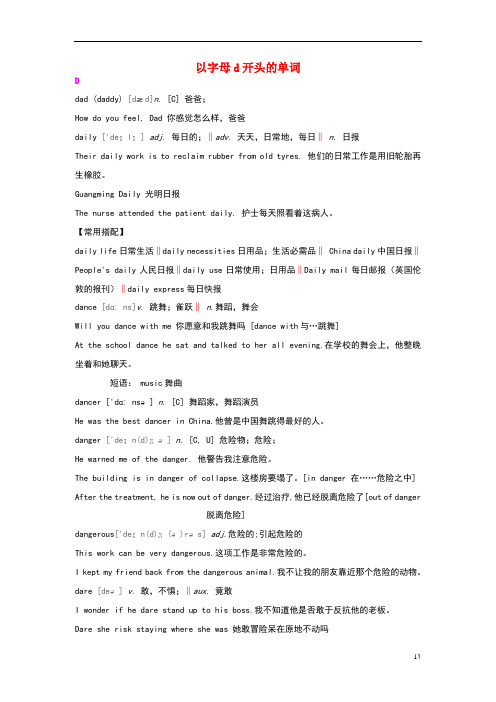
以字母d开头的单词Ddad (daddy) [dæd]n. [C] 爸爸;How do you feel, Dad 你感觉怎么样,爸爸daily ['deɪlɪ]adj.每日的;‖adv.天天,日常地,每日‖ n.日报Their daily work is to reclaim rubber from old tyres. 他们的日常工作是用旧轮胎再生橡胶。
Guangming Daily 光明日报The nurse attended the patient daily. 护士每天照看着这病人。
【常用搭配】daily life日常生活‖daily necessities日用品;生活必需品‖ China daily中国日报‖People's daily人民日报‖daily use日常使用;日用品‖Daily mail每日邮报(英国伦敦的报刊)‖daily express每日快报dance [dɑːns]v. 跳舞;雀跃‖ n.舞蹈,舞会Will you dance with me 你愿意和我跳舞吗 [dance with与…跳舞]At the school dance he sat and talked to her all evening.在学校的舞会上,他整晚坐着和她聊天。
短语: music舞曲dancer ['dɑːnsə] n. [C] 舞蹈家,舞蹈演员He was the best dancer in China.他曾是中国舞跳得最好的人。
danger ['deɪn(d)ʒə]n. [C, U] 危险物;危险;He warned me of the danger. 他警告我注意危险。
The building is in danger of collapse.这楼房要塌了。
[in danger 在……危险之中] After the treatment, he is now out of danger.经过治疗,他已经脱离危险了[out of danger脱离危险]dangerous['deɪn(d)ʒ(ə)rəs]adj.危险的;引起危险的This work can be very dangerous.这项工作是非常危险的。
译林版英语四年级下册_课外拓展:星期的由来
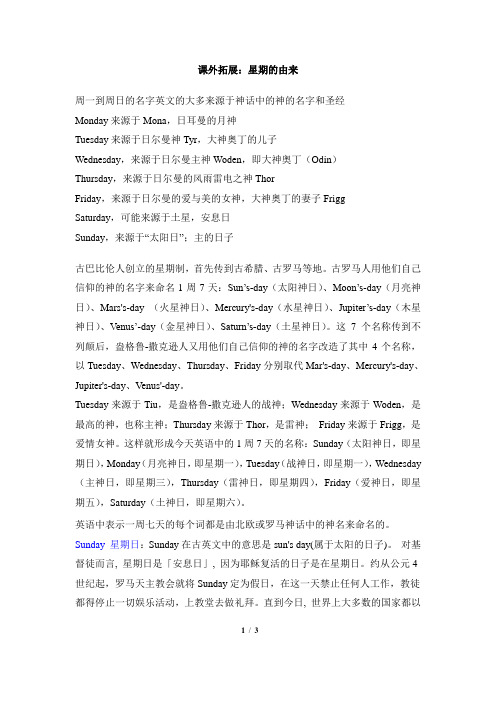
课外拓展:星期的由来周一到周日的名字英文的大多来源于神话中的神的名字和圣经Monday来源于Mona,日耳曼的月神Tuesday来源于日尔曼神Tyr,大神奥丁的儿子Wednesday,来源于日尔曼主神Woden,即大神奥丁(Odin)Thursday,来源于日尔曼的风雨雷电之神ThorFriday,来源于日尔曼的爱与美的女神,大神奥丁的妻子FriggSaturday,可能来源于土星,安息日Sunday,来源于“太阳日”;主的日子古巴比伦人创立的星期制,首先传到古希腊、古罗马等地。
古罗马人用他们自己信仰的神的名字来命名1周7天:Sun’s-day(太阳神日)、Moon’s-day(月亮神日)、Mars's-day (火星神日)、Mercury's-day(水星神日)、Jupiter’s-day(木星神日)、Venus’-day(金星神日)、Saturn’s-day(土星神日)。
这7个名称传到不列颠后,盎格鲁-撒克逊人又用他们自己信仰的神的名字改造了其中4个名称,以Tuesday、Wednesday、Thursday、Friday分别取代Mar's-day、Mercury's-day、Jupiter's-day、Venus'-day。
Tuesday来源于Tiu,是盎格鲁-撒克逊人的战神;Wednesday来源于Woden,是最高的神,也称主神;Thursday来源于Thor,是雷神;Friday来源于Frigg,是爱情女神。
这样就形成今天英语中的1周7天的名称:Sunday(太阳神日,即星期日),Monday(月亮神日,即星期一),Tuesday(战神日,即星期一),Wednesday (主神日,即星期三),Thursday(雷神日,即星期四),Friday(爱神日,即星期五),Saturday(土神日,即星期六)。
英语中表示一周七天的每个词都是由北欧或罗马神话中的神名来命名的。
初中英语必考词汇1600词汇详解
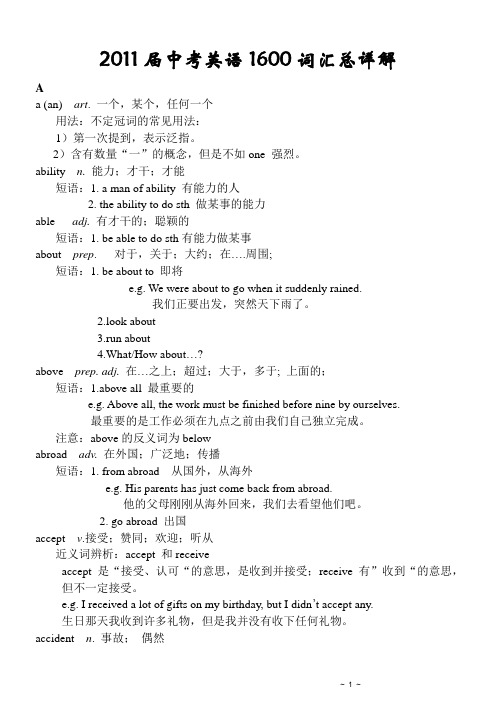
2011届中考英语1600词汇总详解Aa (an) art. 一个,某个,任何一个用法:不定冠词的常见用法:1)第一次提到,表示泛指。
2)含有数量“一”的概念,但是不如one 强烈。
ability n.能力;才干;才能短语:1. a man of ability 有能力的人2. the ability to do sth 做某事的能力able adj.有才干的;聪颖的短语:1. be able to do sth有能力做某事about prep. 对于,关于;大约;在….周围;短语:1. be about to 即将e.g. We were about to go when it suddenly rained.我们正要出发,突然天下雨了。
2.look about3.run about4.What/How about…?above prep. adj.在…之上;超过;大于,多于; 上面的;短语:1.above all 最重要的e.g. Above all, the work must be finished before nine by ourselves.最重要的是工作必须在九点之前由我们自己独立完成。
注意:above的反义词为belowabroad adv. 在外国;广泛地;传播短语:1. from abroad 从国外,从海外e.g. His parents has just come back from abroad.他的父母刚刚从海外回来,我们去看望他们吧。
2. go abroad 出国accept v.接受;赞同;欢迎;听从近义词辨析:accept 和receiveaccept 是“接受、认可“的意思,是收到并接受;receive 有”收到“的意思,但不一定接受。
e.g. I received a lot of gifts on my birthday, but I didn’t accept any.生日那天我收到许多礼物,但是我并没有收下任何礼物。
中考英语总复习英语1600词汇详解(教师版)习题及答案
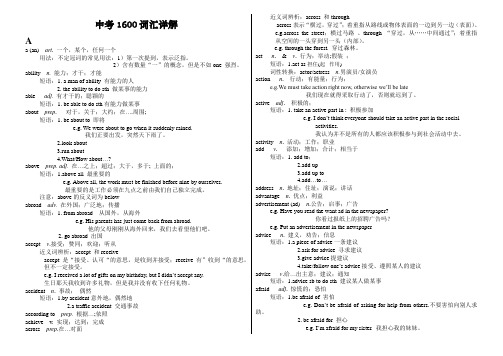
中考1600词汇详解Aa (an) art. 一个,某个,任何一个用法:不定冠词的常见用法:1)第一次提到,表示泛指。
2)含有数量“一”的概念,但是不如one 强烈。
ability n.能力;才干;才能短语:1. a man of ability 有能力的人2. the ability to do sth 做某事的能力able adj.有才干的;聪颖的短语:1. be able to do sth有能力做某事about prep. 对于,关于;大约;在….周围;短语:1. be about to 即将e.g. We were about to go when it suddenly rained.我们正要出发,突然天下雨了。
2.look about3.run about4.What/How about…?above prep. adj.在…之上;超过;大于,多于; 上面的;短语:1.above all 最重要的e.g. Above all, the work must be finished before nine by ourselves.最重要的是工作必须在九点之前由我们自己独立完成。
注意:above的反义词为belowabroad adv. 在外国;广泛地;传播短语:1. from abroad 从国外,从海外e.g. His parents has just come back from abroad.他的父母刚刚从海外回来,我们去看望他们吧。
2. go abroad 出国accept v.接受;赞同;欢迎;听从近义词辨析:accept 和receiveaccept 是“接受、认可“的意思,是收到并接受;receive 有”收到“的意思,但不一定接受。
e.g. I received a lot of gifts on my birthday, but I didn’t accept any.生日那天我收到许多礼物,但是我并没有收下任何礼物。
day的动词形式

day的动词形式day的动词形式是days。
它是day的第三人称单数和单数现在时的形式。
1. He days the fitness routine by exercising for an hour every morning.(他通过每天早上一小时的锻炼日复一日地坚持健身计划。
)2. She days the flowers in her garden carefully to ensure they thrive.(她日复一日地细心照料花园里的花朵,以确保它们茁壮成长。
)3. They day the streets of the city with beautiful decorations for the upcoming festival.(他们在即将到来的节日里日复一日地给城市的街道装饰美丽的装饰品。
)4. The chef days the soup by adding a pinch of salt and simmering it for an hour.(厨师通过加入一撮盐,并煮沸一小时来日复一日地烹饪汤。
)5. I don't like it when people day their responsibilities and make excuses.(当人们日复一日地推卸责任并找借口时,我不喜欢。
)6. The teacher days the importance of practice to her students.(老师向学生们强调练习的重要性,日复一日地教导他们。
)7. We need to day our efforts to reduce waste and protect the environment.(我们需要日复一日地努力减少废物并保护环境。
)8. The team days their teamwork skills through regular training sessions.(团队通过定期的培训课程日复一日地提升团队合作能力。
- 1、下载文档前请自行甄别文档内容的完整性,平台不提供额外的编辑、内容补充、找答案等附加服务。
- 2、"仅部分预览"的文档,不可在线预览部分如存在完整性等问题,可反馈申请退款(可完整预览的文档不适用该条件!)。
- 3、如文档侵犯您的权益,请联系客服反馈,我们会尽快为您处理(人工客服工作时间:9:00-18:30)。
Day v. Sidley & AustinThis case involves a dispute between a former senior partner of Sidley & Austin (S & A), a Chicago law firm, and some of his fellow partners. The controversy centers around the merger between that firm and another Chicago firm. Liebman, Williams, Bennett, Baird and Minow (Liebarn firm), and the events subsequent to the merger which ultimately led to plaintiff’s resignation. Plaintiff seeks damages claiming a substantial loss of income, damage to his professional reputation and personal embarrassment which resulted from his forced resignation.The matter is now before the Court on defendants' motion for summary judgment. After consideration of the pre- and post- hearing memoranda of counsel, answers to interrogatories, affidavits, and oral arguments, this Court concludes that defendants’ motion for summary judgment should be granted.The Factual BackgroundThe basic and material facts in this controversy may be briefly detailed.Mr. Day was first associated with Sidley & Austin in 1938. His legal career was interrupted by World War II service in the Navy and by his tenure with both the Illinois state government and as Postmaster General of the United States. Upon leaving the federal government, he was instrumental in establishing a Washington office for the firm in 1963. As a senior underwriting partner, he was entitled to a certain percentage of the firm’s profits, and was also privileged to vote on certain matters that were specified in the partnership agreement. He was never a member of the executive committee, however, which managed the firm’s day-to-day business. He remained an underwriting partner with S&A from 1963 until his resignation in December 1972.At some time between February 1972 and July 12, 1972, S&A’s executive committee explored the idea of a possible merger between that firm and the Liebman firm. S&A partners who were not on the executive committee were unaware of the proposal until it was revealed at a special meeting of its underwriting partner on July 17, 1972. At that meeting, each partner present, including plaintiff, voiced approval of the merger idea and favored pursuing further that possibility in such manner as the executive committee of S&A might think proper or advisable, with the understanding that any proposed agreement would first be submitted to all partners for their consideration before any binding commitments were made.The merger was further discussed at meetings of the underwriting partners held on September 6, September 22, September 26 and September 28. The plaintiff received timely notice of the meetings but did not attend.The final Memorandum of Understanding dated September 29, 1972 and the final amended Partnership Agreement, dated October 16, 1972 were executed by all S & A partners, including plaintiff. The Memorandum incorporated a minor change requested by plaintiff.At a meeting of the executive committee of the combined firm on October 16, 1972, it was decided that the Washington offices and the Washington office committees of the two predecessor firms would be consolidated. The former chairmen of the Washington office committees of the two firms were appointed co- chairmen of the new Washington Office Committee.In late October of 1972, the new Washington Office Committee recommended to the Management Committee that a combined Washington office be set up at 1730 Pennsylvania Avenue, thus eliminating the old S & A Washington office in the Cafritz Building. A decision was then made to move to the new location despite plaintiff’s objections.Mr. Day resigned from S&A effective December 31, 1972 claiming that the changes which occurred after the merger in the Washington office - the appointment of co-chairmen and the relocation of the office - made continued service with the firm intolerable for him.Mr. Day contends that he had a contractual fight to remain the sole chairman of the Washington office, and that the maintenance of this status was a condition precedent for his rejoining the firm in 1963 and opening the Washington office. According to plaintiff, the decision to appoint co- chairmen was made prior to the merger and defendants' concealment of that decision was a material omission and without that prior information his vote of approval for the merger would not have been given.He further alleges that certain active misrepresentations about the results of the proposal also had the effect of voiding the approval of the merger. These other alleged misrepresentations were:(1) That no Sidley partner would be worse off in any way as a result of the merger, including positions on committees;(2) That two senior partners of the Liebman firm would soon be leaving law practice;(3) That the merged firm would drop representation of a certain Liebman client whose interests might conflict with some Sidley clients;(4) That the merger with Liebman would be advantageous to the Sidley partners and would add to the standing and prestige of the firm;(5) That all aspects of the merger had been exhaustively investigated by defendants; and(6) That there were good, sound, objective reasons which made the merger highly desirable.Plaintiff also alleges that the fact that the Liebman firm had been shopping around for a merger partner for 10 years was concealed.Events after the merger, allegedly void because of the mentioned omissions and misrepresentations, inevitably led to plaintiff's resignation. The loss of his status as sole chairman of the Washington office was viewed by plaintiff as a humiliating experience, especially as it was accompanied by harassment by the defendants. Day points to the method of handling the relocation of the consolidated firm as the most obvious manifestation of the defendants' intent to force his resignation. In an affidavit submitted by plaintiff, he asserts that the process of approving the office move entailed a series of meetings held and decisions made without consulting him, all in derogation of his former status as the final decision maker for the S & A Washington office.Defendants do not concede that misrepresentations or omissions tainted the approval of the merger, nor do they admit engaging in harassment techniques intended to force plaintiff to resign. The thrust of defendants' argument for summary judgment is that plaintiff's factual allegations are not material because they fail to state a cause of action. Defendants contend that any possible taint of plaintiff's vote in favor of the merger is of no consequence because only a majority, and not unanimous consent, was required for the merger under the provisions of the partnership agreements.Defendants also contend that any diminution of status as perceived by plaintiff cannot have any legal consequences because he had no vested contractual right to remain the sole chairman. They rely on the terms of the partnership agreement to support this defense. Under the agreements, the Executive Committee had the authority to govern the composition of all other firm committees and no special provisions had been made as to plaintiff’s vested right in the Washington office.An analysis of the adequacy of each of plaintiff's causes of action follows.FraudThe key misrepresentation which forms the basis of plaintiff's complaint is that no Sidley partner would be worse off as a result of themerger. Plaintiff interpreted this to mean that he would continue to serve as the sole chairman of the Washington office and that he would wield the commanding authority regarding such matters as expanding office space. It was the change in plaintiff’s status at the Washington office which directly precipitated his resignation.This misrepresentation regarding plaintiff's status cannot support a cause of action for fraud, however, because plaintiff was not deprived of any legal right as a result of his reliance on this statement. The 1970 S & A Partnership Agreement, to which plaintiff was a party, sets forth in some detail the relationships among the partners and the structure of the firm. No mention is made of the Washington office or plaintiff's status therein, whereas special arrangements are specified for certain other partners. If chairmanship of the Washington office was of the importance now claimed, the absence of such a provision from the partnership agreement requires a measured explanation which Mr. Day does not supply. Plaintiff’s allegations of an unwritten understanding cannot now be heard to contravene the provisions of the Partnership Agreement which seemingly embodied the complete intentions of the parties as to the manner in which the firm was to be operated and managed.Nor can plaintiff have reasonably believed that no changes would be made in the Washington office since the S & A Agreement gave complete authority to the executive committee to decide questions of firm policy, which would clearly include establishment of committees and the appointment of members and chairpersons. Having read and signed the 1970 and 1972 S & A partnership agreements which implicitly authorized the Executive Committee to create, control or eliminate firm committees, plaintiff could not have reasonably believed that the status of the Washington Office Committee was inviolate and beyond the scope and operation of the Partnership Agreements. Thus, since plaintiff had no right to remain chairman of the Washington office, a misrepresentation regarding his chairmanship does not form the basis for a cause of action in fraud.Breach of Contract, Conspiracy and WrongfulDissolution or Ouster of PartnerAs shown above, plaintiff had no contractual right to maintain his authority over the Washington office, and therefore he has not made out a case for breach of contract. Since he did not have a legal right to maintain his status in the firm, the conspiracy charge amounts to no more than an internal power sweep, executed and permitted under the provisions of thepartnership agreement for which there is no legal remedy.Similarly, there was no wrongful dissolution or ouster of plaintiff from the partnership because the merger of the two firms was authorized under the terms of the S & A partnership agreement. By the terms of the agreement, the executive committee was entrusted with "all questions of Firm policy." Additionally, partners could be admitted and severed from the firm and the partnership agreement could be amended by majority approval by the partners. The merger of S & A with the Liebman firm could be considered either as the admission of new partners or the making of a new or amended agreement, and thus majority approval was all that was required, and a post facto change in plaintiff's vote would be of no effect.Plaintiff contends that the merger was such a fundamental change in the nature of the partnership that unanimous approval was required and that had he known the personal consequences of the merger, he would have exercised a "veto" and the event which forced him to resign would not have occurred. This theory, however, runs counter to the prevailing law of partnership.Generally, common law and statutory standards concerning relationships between partners can be overridden by an agreement reached by the parties themselves. The Uniform Partnership Act (adopted both in Illinois and the District of Columbia) specifically provides that statutory rules governing the rights and duties of the partners are "subject to any agreement between them."Nor do the cases cited by plaintiff support the proposition that unanimous consent is needed for the merger of partnerships. In McCallum v. Asbury, 238 Or. 257, 393 P. 2d 774 (1964), a partner sued to dissolve a partnership of medical doctors. Plaintiff challenged the amendment of the agreement by majority vote which provided for management by an executive committee. The court held that a majority could approve this change, even though the agreement provided that all partners were to have an equal share in management. Likewise, Fortugno v. Hudson Manure Co., 51 N. J. Super. 482, 144 A. 2d 207 (1958), affords little support.Fortugno basically held that a partner could not be effectively changed into a stockholder in a corporation without his consent. In that case, there had been no prior contract that the partnership agreement could be amended by majority vote. The S & A agreement, however, dealt specifically with incorporation of the firm, providing that incorporation would be effective if approved by three-fourths of the partners. Merger was a less dramatic change than incorporation, whichwould have eliminated the partnership entity. It cannot reasonably be argued, therefore, that the merger fell outside the purview of the Agreement, requiring unanimous consent for its approval. Amendments to the Agreement and admission of partners required only majority approval, and plaintiff's proposed "veto power" is nothing more than an expressed hope, incompatible with and contrary to the overall scheme and provisions of the S & A Agreement.Breach of Fiduciary DutyPlaintiff also alleges that defendants breached their fiduciary duty by beginning negotiations on a merger with the Liebman firm without consulting the other partners who were not on the executive committee and by not revealing information regarding changes that would occur as a result of the merger, such as the co-chairmen arrangement for the Washington office. An examination of the case law on a partner's fiduciary duties, however, reveals that courts have been primarily concerned with partners who make secret profits at the expense of the partnership. Partners have a duty to make a full and fair disclosure to other partners of all information which may be of value to the partnership. . . The essence of a breach of fiduciary duty between partners is that one partner has advantaged himself at the expense of the firm .... The basic fiduciary duties are: 1) a partner must account for any profit acquired in a manner injurious to the interests of the partnership, such as commissions or purchases on the sale of partnership property; 2) a partner cannot without the consent of the other partners, acquire for himself a partnership asset, nor may he divert to his own use a partnership opportunity, and 3) he must not compete with the partnership within the scope of the business....A typical case of breach of fiduciary duty and fraud between partners cited by plaintiff is Bakalis v. Bressler, 1 Ill. 2d 72, 115 N. E. 2d 323 (1953). There, a defendant partner had surreptitiously purchased the building which housed the partnership's business and was collecting rents from the partnership for his own profit. What plaintiff is alleging in the instant case, however, concerns failure to reveal information regarding changes in the internal structure of the firm. No court has recognized a fiduciary duty to disclose this type of information, the concealment of which does not produce any profit for the offending partners nor financial loss for the partnership as a whole. Not only was there no financial gain for defendants, but the remaining partners did not acquire any more power within the firm as the result of the alleged withholding of information from plaintiff. They were already members ofthe executive committee and as such had wide-ranging authority with regard to firm management. Thus plaintiff’s claim of breach of fiduciary duty must fail.What this Court perceives from Mr. Day's pleadings and affidavits is that he may be suffering from a bruised ego but that the facts fail to establish a legal cause of action. As an able and experienced attorney, it should have been clear that the differences and misunderstandings which developed with his former partners were business risks of the sort which cannot be resolved by judicial proceedings. Mr. Day, a knowledgeable, sophisticated and experienced businessman and a responsible member of a large law firm, bound himself to a well-defined contractual arrangement when he executed the 1970 Partnership Agreement. The contract clearly provided for management authority in the executive committee and for majority approval of the merger with the Liebman firm. Even if plaintiff had voted against the merger, he could not have stopped it. Furthermore, the partnership agreement, to which he freely consented denies the existence of a contractual right to any particular status within the firm for plaintiff. If plaintiff's partners did indeed combine against him, it is clear that their alleged activities did not amount to illegality, and that any personal humiliation or injury was a risk that he assumed when he joined with others in the partnership.Accordingly it is this 29th of May 1975. Ordered that defendants' motion for summary judgment is granted and the complaint in this proceeding is dismissed with prejudice.Answer the following questions in Chinese according to the case.1、根据时间脉络绘出本案的关系图。
